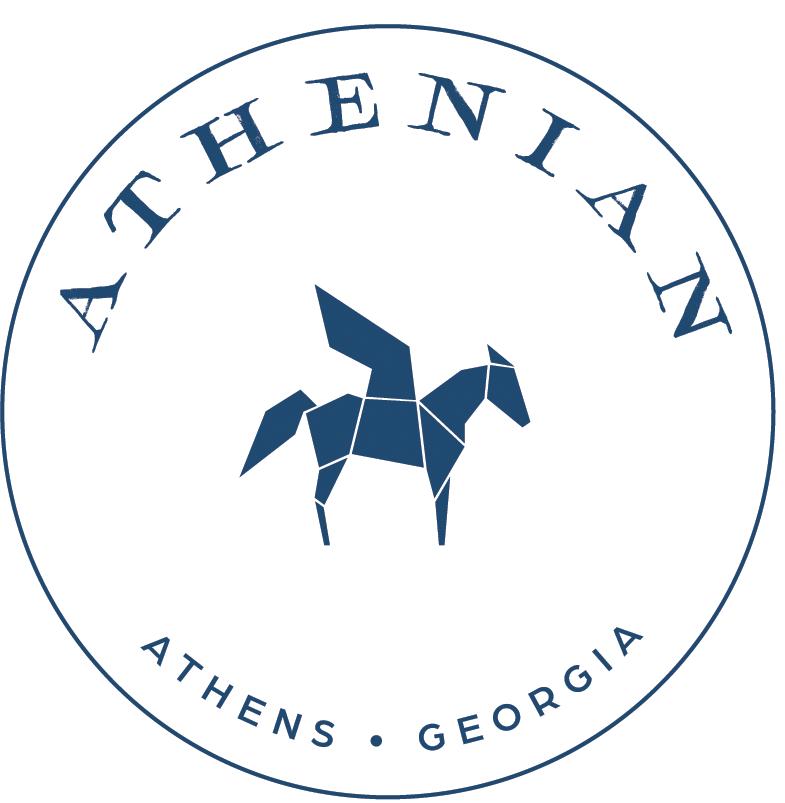

Georgia lawmakers grapple with how to balance federal law and personal safety amidst rising gun violence rates within the state.

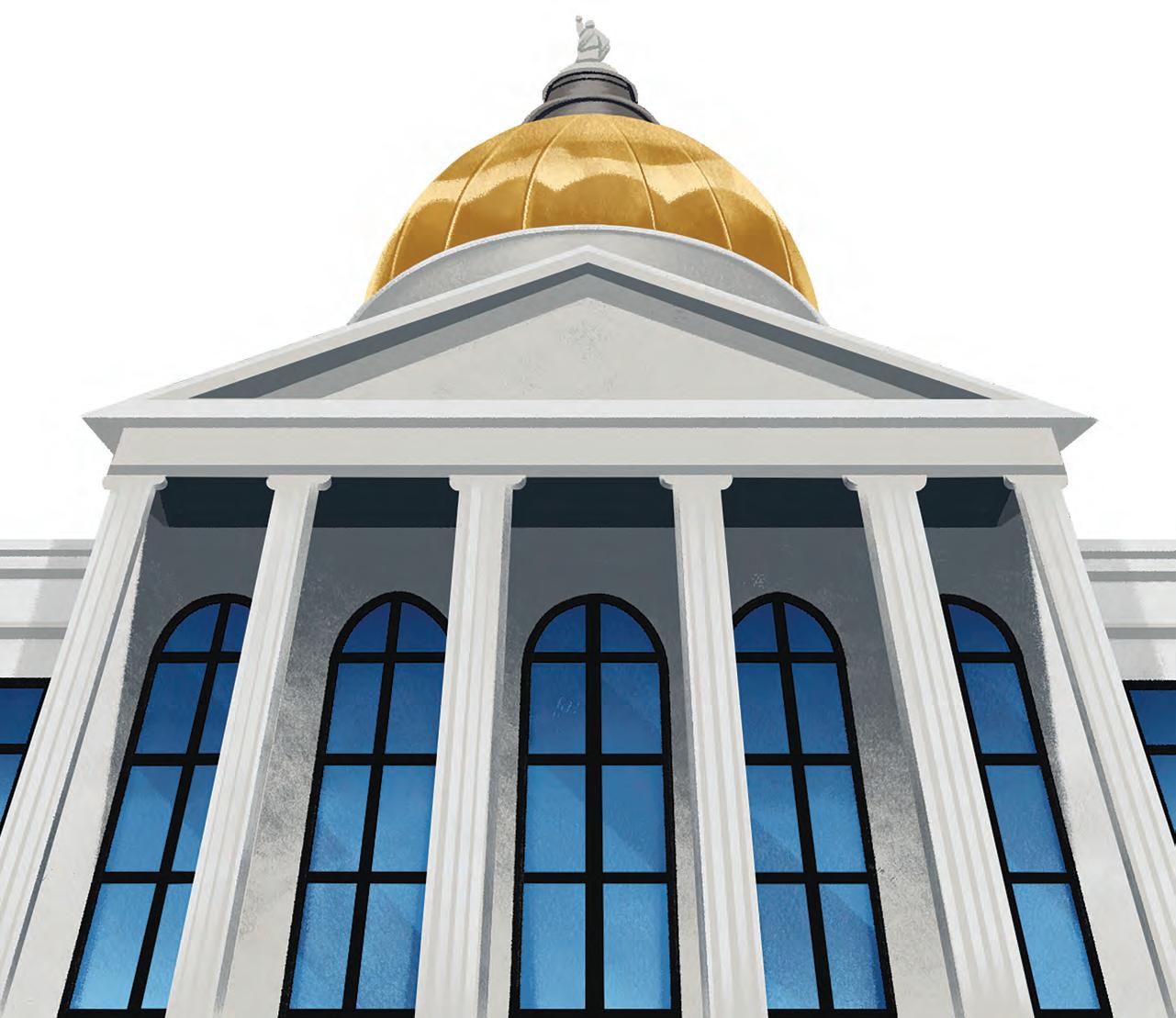











Georgia lawmakers grapple with how to balance federal law and personal safety amidst rising gun violence rates within the state.











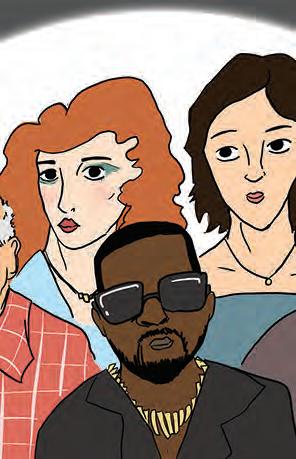
To honor both historical and contemporary works, an artist’s creations should be considered independently from their personal life or character.
BY ISABELLA GRESHAM
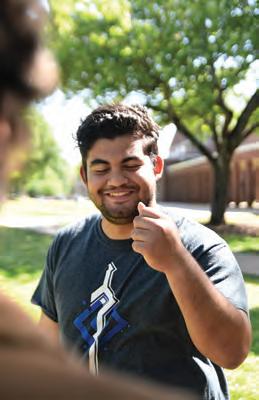
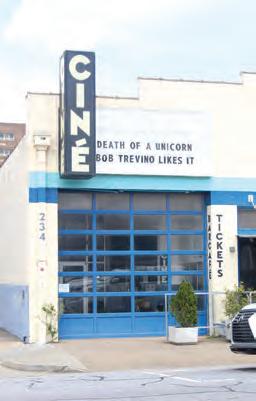
CCHS senior Daniel Castro’s affinity for stories has connected him to his community.
BY EMLYN MCKINNEY
UNDER THE GUN
Georgia lawmakers grapple with how to balance federal law and personal safety amidst rising gun violence rates within the state.
BY JANE RIPPS AND WYATT MEYER
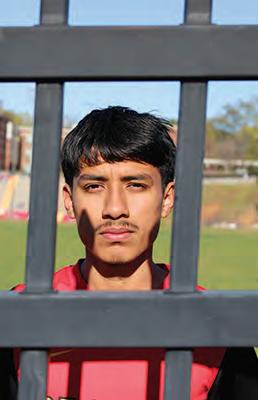
CCHS 2005 alumnus Chuck Griffin created the Athens Film Festival as a way to promote filmmaking in Athens.
BY ABIGAIL HOLLOWAY
Socioeconomic barriers are turning sports into a privlege rather than an opportunity for Athens youth.
BY KEVIN CAPCHA
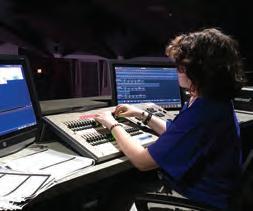
News Staffer Abigail Holloway discusses the technical work she does in the CCHS Drama Club, and its importance in her life.
BY ABIGAIL HOLLOWAY
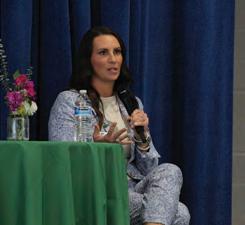
The CCSD held a Mental Health Town Hall at Clarke Middle School on April 28 from 5:307:30 p.m. as a forum to highlight community access to resources.
BY LEA D’ANGELO
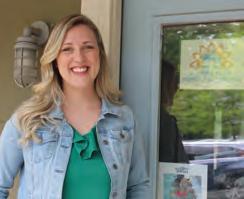
Athens Area Homeless Shelter
Executive Director Olivia Amato discusses her involvement with AAHS and how the organization aids in sheltering the Athens community.
BY ISABELLA GRESHAM
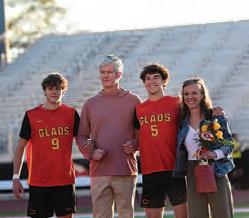
CCHS boys varsity soccer player Grady Payne has spent his final season at CCHS playing on the same team as his younger brother Henry.
BY MZÉE PAVLIĆ
The ODYSSEY is a studentproduced news publication, published with the intent to inform, entertain and give voice to the Clarke Central High School community, as well as to educate student journalists.
Established in 2003, the ODYSSEY is published four times a year, and each issue is an open public forum for student expression under the guidance of a faculty adviser.
Student journalists are provided with opportunities to investigate, inform, interpret and to evaluate: all traditionally accepted functions of the press in America. Published opinions do not necessarily reflect the views of anyone other than the staff.
The ODYSSEY staff is committed to reflect the mission statement set forth by Clarke Central High School. The goals of the staff are to provide fair, accurate news and commentaries, as well as to serve the interests of the school and Athens’ community.
Advertising must conform to the guidelines set forth for editorials. Publication of advertisements does not indicate an endorsement by CCHS or the ODYSSEY staff.
Students pictured in advertisements are not given monetary compensation. All advertising rates are available upon request from any ODYSSEY staff member.
The ODYSSEY is a member of the Columbia Scholastic Press Association, Georgia Scholastic Press Association, National Scholastic Press Association, Quill and Scroll Honor Society and Southern Interscholastic Press Association.
Corrections of errors and omissions will appear in the next issue.
Editor-in-Chief:
Wyatt Meyer
Managing Editor: Jane Ripps
Senior Copy Editor: Miles Lawrence
Viewpoints Editor: Isabella Gresham
News Editor: Liza Larson
Variety Editor: Adah Hamman
Sports Editor: Cooper Jones
Beat Editor: Lydia Rowell
Business Manager: Merren Hines
Social Media Coordinator: Liya Taylor
Digital Editor: Lea D’Angelo
Diversity and Representation Editor: Peter Atchley
Staff Members:
Abigail Holloway
Cesia Martinez
Emlyn McKinney
Gillian Williams
Grady Dunston
Iliana Tejada
Isabel Blankenship
Kevin Capcha
Kimberly Sanabria-Amaya
Kimora Holliday
Ma’Kiyah Thrasher
Mzée Pavlić
Sam Harwell
Sylvia Robinson
Adviser: David A. Ragsdale, CJE
ODYSSEY Newsmagazine
Clarke Central High School
350 S. Milledge Avenue
Athens, Georgia 30605
(706)-357-5200 EXT. 17370
Our Feb./March 2025 issue featured a profile on CCHS Class of 2023 alumnus Malachi McNeill and his mental health journey.
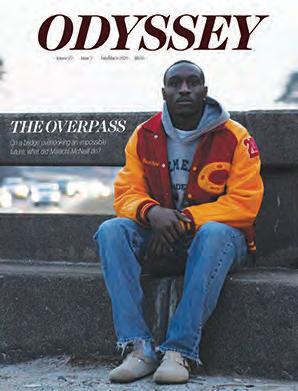
MY WORD VS. YOURS: TIKTOK BAN // Liya Taylor and Lea D’Angelo
I really liked this story because it shared two students’ viewpoints on one topic. I think it is good to have more than one opinion on a certain matter, especially from students of the school. I really enjoyed reading this and hearing the different ideas the writers had on this topic, which can actually help me develop my ideas on it.
-- Londyn Swain CCHS freshman
HERE WE GO AGAIN! // Emlyn McKinney
It gave insight on the behind the scenes of the play “Mamma Mia!” and how working with rivals isn’t that bad after all. Getting to hear individuals who played part in the play speak about how it was like to produce the production, drew my attention. You may think working with rivals would be a conflict but when you read deeper, it actually seems to have been better!
Corrections/Omissions Feb./March 2025
Page 6, in Letter from the Editor, “trainingon” should be “training on.”
Page 9, In “Thumbs,” “defincies” should be “deficiencies.”
Page 22. In “Sunny Skies at CMS,” in the caption “Clarke Middls School” should be “Clarke Middle School.”
29, In “Authentically Adah,” in the story “‘Menendez story’,” should be “‘Menendez story,’”
29, In “Authentically Adah.” “ECOMING DESENSITIZED,” should be “BECOMING DESENSITIZED”
33, In the second pull quote in “Conservation and education” a quotation is missing.
36, In “Celebrating Black Creativity,” in the Mikhayla Robinson Smith blurb “The Day Hip Pop was Born.” should be “The Day Hip Hop was Born.”
his article does a great job of describing the emotions that the students were going through at the Apalachee shooting and how another closely related incidents reinstalled the fear in the students. The article also goes into great detail about the increased security measures at Apalachee and Central. ” ”
TContact the ODYSSEY
-- Maypop Wren, CCHS freshman on “Evaluating Safety” by Liza Larson
Letters: Email us at editors@odysseynewsmagazine.net, or drop off in the Main Office, in care of the ODYSSEY. We ask that all letters be under 250 words and signed. We reserve the right to omit or edit any letters received. Insulting, unsigned or libelous statements will not be considered for publication. All letters may be edited for clarity and space. Advertising: For ad rates email us at business@odysseynewsmagazine. net.
Online: Message us on Instagram at @odysseynewsmag.
-- Kayla Walker, CCHS sophomore
AUTHENTICALLY ADAH // Adah Hamman
Adah Hamman’s article, goes into depth on true crime documentaries that are growing in popularity. They were some of the most popular shows on Netflix and received notice by the Emmy Awards and the Golden Globes. Though gaining all this popularity, the viewers are forgetting that these are true crimes that have happened to families, business owners, sons, and daughters.
-- Lawton Ogburn, CCHS senior
THE OVERPASS // Cooper Jones
Reading The Overpass by Cooper Jones was very eye opening. I knew Malachi Mcneil personally, we became good friends during my freshman and sophomore track season. Allowing Malachi Mcneil who was a formal CCHS student athlete share his story dealing with suicidal thoughts and depresssion was a wonderful way to let all students here at CCHS see that these are situations that many people go through and there are many way you are able to get help. I love how this article captured a huge part of the issue to make other students acknowledge they are not alone. This article touched many students’ hearts along with making students feel more secure.
-- Maria Sesmas-Mondragon CCHS senior
Wyatt Meyer reflects upon the importance of human connection in stories as he leaves the world of scholastic journalism.

BY WYATT MEYER Editor-in-Chief
Across newspaper headlines and Instagram captions, an understated, almost secret journalistic revolution has been brewing for the last 15 years. It’s neither a revolution waged with swords and spears – nor even pens and printers – but with a far more concrete entity.
No, this revolution is fought with you, the reader.
Traditionally, the relationship between me, the journalist, and you, the audience, was strictly confined to third-person objectivity in news writing, while opinion pieces retained a measure of detachment. Ball State University’s journalism blog testifies to this classical perspective: “In order to remain objective, journalists must keep themselves out of stories.”
Press) are just two examples.
Plenty of journalists and media experts – that say this personal connection with the audience is purely detrimental. After all, U.S. trust in media plummeted during the 2010s and 2020s, reaching an all time low of 31% in 2023, according to a Gallup poll. The decline of trust is correlated with the rise of social media audience engagement journalism.
In spite of the evidence, I disagree with this notion. Audience engagement in journalism can be dangerous, but it can be even more powerful.
When I think about the present state of journalism, I think about connection. As humans and society have evolved, we have looked for connection – communication has gone from letters to telegrams to emails to texting, each bringing people ever closer to each other. The same is now true of the media.
As journalists in a delicately intertwined world, connection is not something to shy away from.
The advent of social media turned this notion on its head. On a platform designed to manufacture relationships, journalists saw an opportunity to create more impactful stories not by distancing the reader, but by inviting them to participate in the story. Thus was born audience engagement, a principle, which refers to the “cognitive, emotional, or affective experiences that users have with media content,” as defined by University of Groningen professor Marcel Broersma.
Nowadays, stories and headlines not only mention the reader, they’re often addressed to them in hopes readers engage. “Tips for Protecting Your Home From Extreme Weather” (New York Times) and “RFK Jr. is targeting ultraprocessed foods. What are they, and are they bad for you?” (Associated
Right: Editor-in-Chief Wyatt Meyer’s words worm their way into the head of an attentive listener. In four years as a student journalist, Meyer has observed increased connection with readers throughout journalism. “Audience engagement isn’t inherently good or bad in the same way that enhanced connection isn’t – it creates new opportunities beyond our ancestors’ wildest dreams,” Meyer wrote. Illustration by Sam Harwell
This idea is backed up by research: a team of professors from several European universities conducted a test with South American news outlet BioBio Chile that contradicted the assumption that audience engagement journalism threatens trust in the media. Instead, they found that connection made BioBio Chile’s stories more relatable.
Audience engagement isn’t inherently good or bad in the same way that enhanced connection isn’t – it creates new opportunities beyond our ancestors’ wildest dreams.
It is up to journalists to ensure those dreams don’t turn to nightmares.
As journalists in a delicately intertwined world, connection is not something to shy away from. It is a tool that journalists can – and must – wield to tell stories that evoke an emotion, inspire change or impact others somehow.
The good news for readers is that your job remains the same: bear witness.
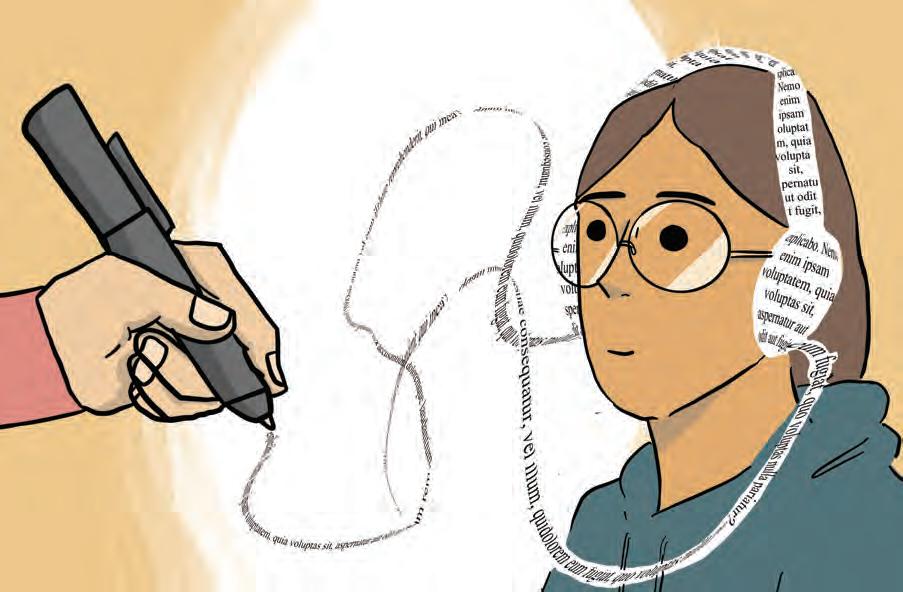
Research is imperative for societal progression, yet the push for funding cuts from politicians has national and global consequences.

BY JANE RIPPS Managing Editor
When the COVID-19 virus barged into the homes of people around the world in 2020, promptly taking an uninvited seat at the dinner table, the negative implications of the respiratory disease showed no mercy.
According to the World Health Organization, there were approximately 85 million reported cases globally by the end of 2020 and 1.8 million deaths.
In the face of this mysterious and contagious disease, scientists wasted no time manufacturing an effective vaccine in just 12 months — the fastest vaccine ever created.
Only five years later, politicians have clearly forgotten this reality.
The trickle-down implications of the lack of research fester in the very community that hosts UGA: Athens.
On Feb. 9, United States President Donald Trump and his administration issued the first of many cuts to Nation Institutes of Health (NIH) grants to research facilities and universities across the nation.
One order issued a 15 percent cut to indirect costs for covering facilities and administrative goods on both future and existing grants. This means that money typically allocated towards the actual research would be forced to cover indirect costs, fostering inefficiency and limiting funds to make progress.
From Feb. 28 to March 28, KFF Health News found that the NIH terminated about 780 grants or parts of grants.
This direct attack on science raises questions on what kind of reality the world would face without the prioritization of research in all fields. Here’s a hint: it’s dangerous.
In Athens-Clarke County – the home of the University of Georgia, a Carnegie Research 1 Institution – research across all disciplines is what shapes the innovation of education. Regardless, many professors find their work being scrapped due to funding cuts.
Erin Dolan, a professor of biochemistry and molecular biology, is one. In early March, Dolan’s two NIH grants were cancelled, one of which was a $1.25 million grant funding the study of how faculty could improve their efficiency as mentors for graduate students.
“$600,000 have already been invested in doing all the design work, doing all the careful testing and refinement to be able to do the full robust test. But, because we don’t have the last two years of funding, we can’t do that, so it’s a
waste,” Dolan said.
The trickle-down implications of the lack of research fester in the very community that hosts UGA: Athens.
According to Online Athens, UGA generates “an estimated economic impact of $290 million each year in Clarke County alone. UGA is the county’s top employer, with nearly 5,000 of its employees residing in Clarke County.”
Cutting research would just be the beginning of the attack on the very infrastructure of the Athens community.
However, the best course of action research institutions such as UGA can take to fight back against the Trump administration is unclear and dangerous. Harvard University – which resisted government control in its education – is facing the freeze of $2.2 billion in federal grants because of noncompliance. In response, the university has filed a lawsuit against the federal government to challenge the funding freeze.
But this should not be used as an excuse to not fight back. Even in unpredictable and unprecedented times – in fact, especially in them – research is crucial in ensuring the livelihood and well being of Americans. As such, research institutions need to tread lightly, but fight to continue their research and maintain their integrity.
It is an imperative battle for everyone who believes in the future.
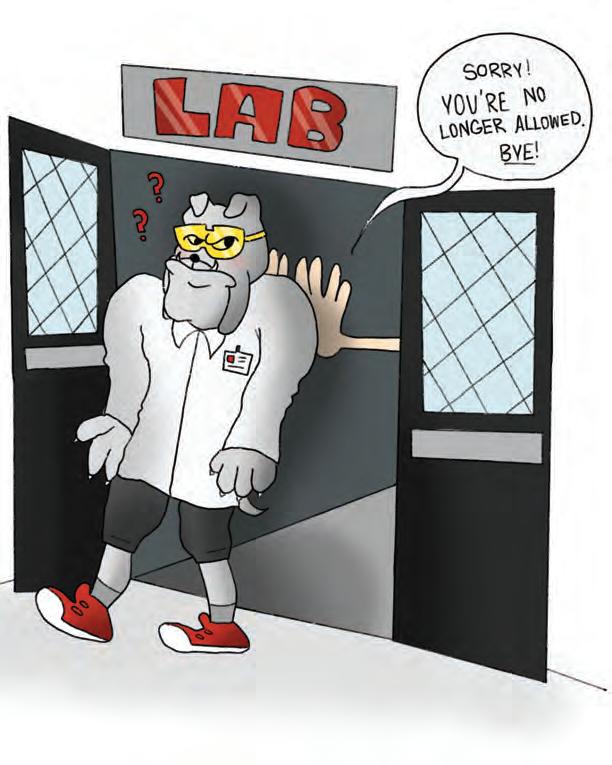

When I started Irish dance in 2017, it was unlike anything I had done before. I was thrown into a small, welcoming class and immediately felt at home, even though I knew nothing about the sport.
I first discovered it at Dancefx, where I was already taking other classes. Out of curiosity, I gave it a try, and instantly fell in love with the music, full of unique instruments like accordions, harps and violins.
The dancing, itself, was a challenge. We couldn’t use our arms, and all the movement came from our feet. It felt strange at first, but over time it became second nature. Now, every time I step into class, it still feels like home.
When I talk about Irish dance, many find it odd—especially the wigs, sparkly costumes and strict posture. But for Irish people, it’s tradition, a way to honor those who came before us while keeping the culture alive.
Irish dance has taught me passion, discipline, time management and resilience. I’ve faced bullying and injuries—including a broken foot and torn hip flexors—but those challenges only made me stronger and more determined.
Most of all, I’m grateful for the friendships I’ve made. As I look ahead to a new season, I hope to be a leader, a good teammate, and a lifelong learner. Here’s to many more years of dance, competition and laughter.
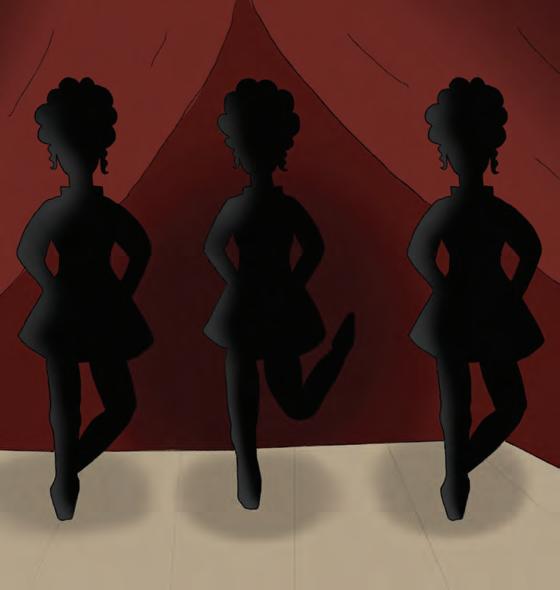
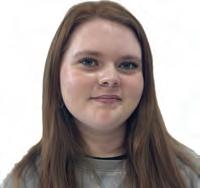
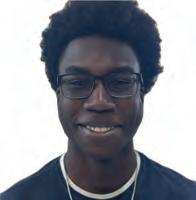
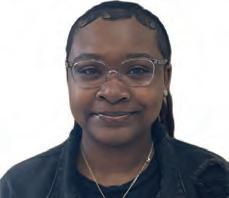


“I’m most looking forward to seeing my friends who don’t go to (CCHS). I’ll also be in a play this summer, ‘Charlie and the Chocolate Factory.’”
-- ALORA PLEMMONS, CCHS freshman
“I’m looking forward to my job. It’s my first one, so it’ll be a new experience, but it’ll be nice to finally be able to have my own income.”
-- JEREMY ANDERSON, CCHS sophomore
“Focusing on myself, working, getting money and having fun with my friends. ”
-- KAITLYN RANDOLPH, CCHS junior
“I like to go to Romania with my dad, visiting my Grandma and family. It’s also my last (summer) before I go off to college, so just chilling.”
-- LUCIAN PRELIPCEANU, CCHS senior
“Being able to enjoy the afternoon and early morning with my family and pets.”
-- JOSHUA DAWSON, CCHS physical education department teacher
The ODYSSEY staff’s opinions on this month’s issues.
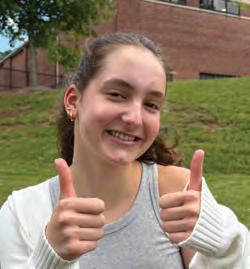
Athens is bursting with music, murals and creativity, but one art form is missing: film. Athens Film Festival founder, Chuck Griffin filled the gap.
Variety Staffer Cesia Martinez experienced what it’s like to make and paint pottery.
Former CCHS football star
Jack Mangel returns to CCHS—this time, with a lesson plan instead of a playbook.
He grew up loving stories, now he’s living one worth telling. CCHS senior Daniel Castro’s affinity for storytelling connects him to those around him.
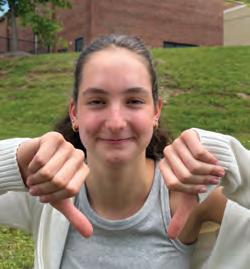
Senior superlatives aim to celebrate students, but more often spotlight the politics of high school popularity.
As the cost of youth sports continues to rise, access is increasingly defined by income—not talent.
As DEI programs fade, students and staff are left questioning how to move forward without these crucial initiatives for inclusion and equity.
What begins as admiration for celebrities can cross the line into invasive behavior, blurring the boundaries between public and private life.
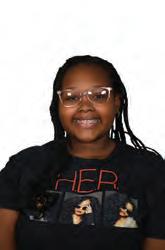
Without ASL at CCHS, deaf students face isolation. A class could change that.
Every day, Cedar Shoals High School sophomore Sa’ida Arnold walks into the cafeteria for lunch without hearing a single sound. Born Deaf and hard of hearing, Arnold has lived this reality for 15 years.
According to the University of Washington’s Disabilities, Opportunities, Internetworking, and Technology program, “Functional hearing loss ranges from mild to profound,” with individuals identifying as either “deaf” or “hard of hearing” depending on the severity.
There are several communication methods used by deaf and hard of hearing (HoH) individuals, including American Sign Language (ASL), a visual language expressed through hand and facial movements. According to the National Institute on Deafness and Other Communication Disorders, ASL is the primary language for many deaf and HoH North Americans and is also used by some hearing individuals.
Approximately 500,000 people in the U.S. use ASL, and it is taught at 1,000 public high schools, yet Clarke Central High School does not offer ASL as a foreign language.
Learning ASL improves communication and fosters a sense of community, which is especially important for students like Arnold.
“Because other students are hearing, they don’t know ASL (or) they only know little to no ASL. So because of the language barrier, (connecting with other students) has been difficult,” Arnold said.
Northeast Georgia RESA Educational Interpreter Taryn Magloire, who has worked with Arnold for two years, has witnessed these challenges.
“The cool thing about ASL, it’s actually pretty easy to pick up, but oftentimes students feel really awkward or intimidated. It’s hard to make friends,” Magloire said.
Without ASL instruction at CCHS, hearing students face a communication barrier with their deaf and HoH peers, limiting connection and inclusion. While funding and resources may present challenges, not offering ASL ultimately harms the ability of these students to build meaningful relationships.
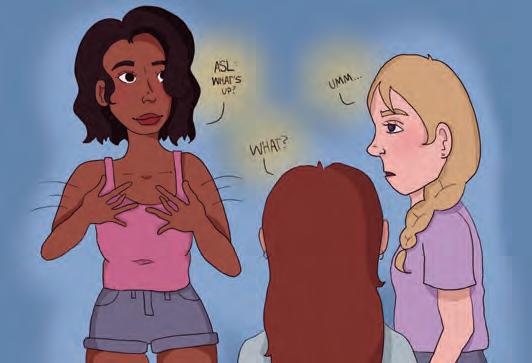
After

BY MILES LAWRENCE
Senior Copy Editor
As seniors prepare to launch into the daunting uncertainty of adulthood, it can be difficult to leave behind the suffocating, social experiment that is Clarke Central High School.
Sweaty Friday night football games, brightly-lit homecoming dances and social cliques more rigid than the caste system. I mean, what’s not to miss?
With such a busy end to the school year, capturing the true essence of the senior class can seem impossible, but luckily there’s a tradition in place to make it easier: senior superlatives.
Introduced into American culture in the early 1900s and incorporated into high school yearbooks, senior superlatives are prestigious awards that will define CCHS’ most honorable senior’s identities for eternity. Forget insignificant things like GPA or involvement in extracurriculars, superlatives are what you’ll be remembered for at every class reunion for the rest of time.
play-by-play of all of your relationship drama, you have no chance of winning. Senior superlatives are commonly referred to by parents and teachers as a “toxic popularity contest,” but think about it, who else would you want to represent your class? Seniors who haven’t peaked in high school? Psshhhhh.
To prevent this, a few high schools across the country have begun to let faculty members vote for the recipients of yearbook superlative awards, but thankfully, CCHS has kept the old-fashioned tradition of encouraging students to vote for members of their class. Come on, what could be the possible downside of letting students vote their peers for “biggest crashout” or “teacher’s pet?”
Who else would you want to represent your class? Seniors who haven’t peaked in high school?
A study published by the National Institute of Health (NIH) argues against superlatives, suggesting that students’ perceived “popularity” correlates closely with their mental health, as students with low social status report having higher psychological distress and inattention issues.
“Best dressed,” “coolest car,” and “biggest flirt” are just a few of the esteemed superlatives members of CCHS’ graduating class could receive, but here’s the catch — you have to be popular enough to win.
It’s simple really: unless each kid in your class knows your full name and a
But what better way to improve this than pitting everyone against each other just to celebrate those already on a pedestal?
I mean, as CCHS’ Most Likely to be Famous, I guess the recipients do deserve the recognition.
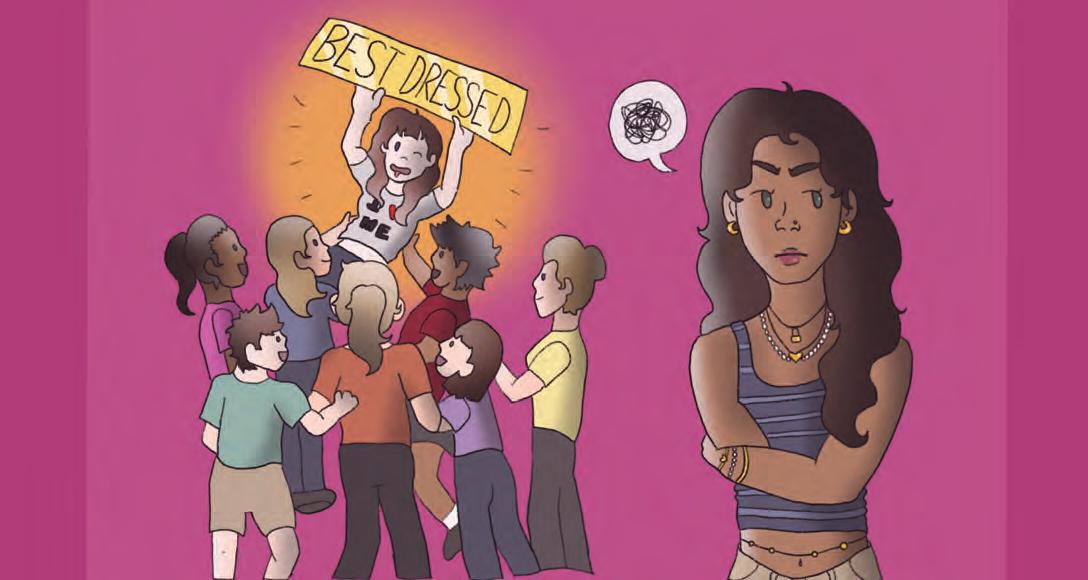
An artist’s work should be separated from the creator to commemorate historical and modern pieces.

BY ISABELLA GRESHAM Viewpoints Editor
Nearly every genre of music includes an artist who has succumbed to some sort of controversy or cancellable offense.
As defined by Merriam-Webster, “Cancel culture is the practice or tendency of engaging in mass canceling to express disapproval and exert social pressure.” From the most extreme cases like Kanye West down to mild ones like Chappell Roan, artists have continuously fallen victim to cancel culture. But at what point does one too many inappropriate comments, actions or accusations lead to boycotting the artist’s work in an attempt to diminish their value? When does this extreme cancellation become rightfully justified? How can artists be held accountable?
Though an artist’s opinions or actions may be defined as cancellable, a notable piece of work remains significant and should not receive the same repercussions as the creator.
However, convoluted artwork should be viewed with a censorious lens.
an inappropriate and nearly predatory comment to her Instagram account in 2018 about a then 14-year-old Finn Wolfhard. Regardless, she has served as the opening act for American singer and songwriter Taylor Swift’s “The Eras Tour” 49 times in 2023.
Abrams and many other artists prove that, despite their personal life or background, a great piece of work is still a great piece of work. Inherently bad actions do not diminish what an artist has accomplished.
Picasso’s work is still displayed and highly appraised. Wagner’s music composition still revolutionized opera. Abrams has still exploded as a new artist and continues to grow her fan base despite her inappropriate comment.
While the line can blur, music and artwork continue to become popular for a reason. Even if the artist isn’t morally sound, that doesn’t determine the quality of their artwork.
While the line can blur, music and artwork continue to become popular for a reason.
Throughout history, great artworks have been commemorated despite the artist’s background. For example, Spanish painter and sculptor Pablo Picasso’s famous paintings, like “Les Demoiselles d’Avignon” or “The Young Ladies of Avignon,” have been appraised for decades, though these works represent misogyny.
“The artist, as an artist, has no ethical obligations, whatsoever. As human beings, they do. If you look at a composer like Richard Wagner, (he was) a great opera composer, but he was a rabid anti-Semite. He was a racist. He was a terrible human being. That does not diminish his greatness as a composer,” Clarke Central High School English department teacher Ian Altman said.
This construct is present in the media today through modern artists. American singer and songwriter Gracie Abrams, who was 18 at the time, posted
However, in today’s society, where the world is dominated by social media and cancel culture is rampant, it’s important to approach opposed artwork cautiously, with a censorious lens.
“(An artist’s actions) might color the lens at which you’re examining the piece. I think (music from a cancelled artist) definitely needs more consideration,” University of Georgia Assistant Professor of Music Education Alison Farley said. “If you’re gonna be putting it forward as an artifact to be admired or to be performed or appreciated, then you need a pretty strong rationale as to why the music, itself, is worth importance in isolation from who composed it.”
The audience should indulge in artwork critically, know when immoral opinions or actions bleed into the artwork and choose to stay away from particularly negative pieces.
Quality artwork should continue to be commemorated, but it’s important to view it critically to avoid celebrating immoral people.
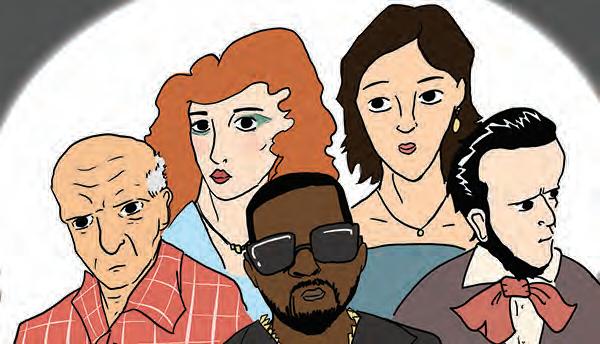
An illustration depicting artists in front of a
is shown. Though some artists have performed wrongful actions, their work should be analyzed seperately. “(Gracie) Abrams and many other artists prove that, despite their personal life or background, a great piece of work is still a great piece of work,” Gresham wrote. “Inherently bad actions do not diminish what an artist has accomplished.” Illustration by Sam
The
elimination of Diversity, Equity and Inclusion programs and the federal Department of Education is detrimental to
CCHS students.
In a sweeping move, President Donald Trump and his administration issued direct attacks on public education.
The cutbacks began on Jan. 20 when the Trump administration issued an executive order eliminating Diversity, Equity and Inclusion initiatives in all government institutions. A second executive order followed on March 20, removing the federal Department of Education (ED), returning all functions to the state level.
However, it doesn’t stop at the government level. According to the Associated Press, the Trump administration’s DEI directives prohibit racebased considerations in admissions, hiring, scholarships, student organizations and even curriculum content within public schools.
In addition, dismantling the ED shifts all responsibility for education to the state level, leading to a rollback of critical funding.
including those in the Clarke County School District.
According to the Census Bureau, 26.3% of Athens-Clarke County is below the poverty line, and 30.5% of the population belongs to a racial minority. Losing federal funding has a greater impact on these communities as they are more likely to depend on education social services like Title I programs, which are funded by the federal ED and provide financial assistance to schools with high percentages of students who come from low-income families.
The consequences of these policy shifts are playing out in other higher education institutions as well. For example, the University of Michigan eliminated its LEAD scholarship, which aimed to increase minority student enrollment.
The political actions of the Trump administration threaten to undo decades of progress.
The funding cuts have already played out in educational institutions like Harvard University. On April 14, the Trump administration froze more than $2.2 billion of funding, grants and contracts in response to the university’s refusal to change DEI policies. Though Harvard University is a private institution, its high profile clash with the federal government could set a precedent for how similar policies are treated at other educational institutions across the country.
In a letter to students and faculty on the day of the funding cuts, Harvard’s president, Dr. Alan Garber, wrote, “The disruption of learning that has plagued campuses in recent years is unacceptable. It is time for elite universities to take the problem seriously and commit to meaningful change.”
The political actions of the Trump administration threaten to undo decades of progress in making education more accessible for marginalized communities,
Additionally, the Georgia Institute of Technology got rid of its Multicultural Student Center, which previously served as a space for students of color to find community.
“It’s so important to give students who come from backgrounds that didn’t receive as much support or their families don’t have as much money as others a leg up so that they can have equity with other students who maybe had those advantages,” Georgia Institute of Technology freshman and Clarke Central High School 2024 graduate Katherine Queen said.
For schools across the country that rely on the ED for aid money, like CCHS and public universities, this has dire consequences.
“Federal funding goes to giving Pell grants like HOPE and Zell Miller scholarships, which helps students, but it also helps the school because a school can’t survive without diversity, and can’t survive without having those students,” Queen said.
The shift in authority from the federal to the state level may lead to a significant reduction in funding, resulting in fewer resources for under-served communities with programs like free lunch at risk. Despite these developments, there is still widespread uncertainty regarding how the changes will affect schools in the long term.
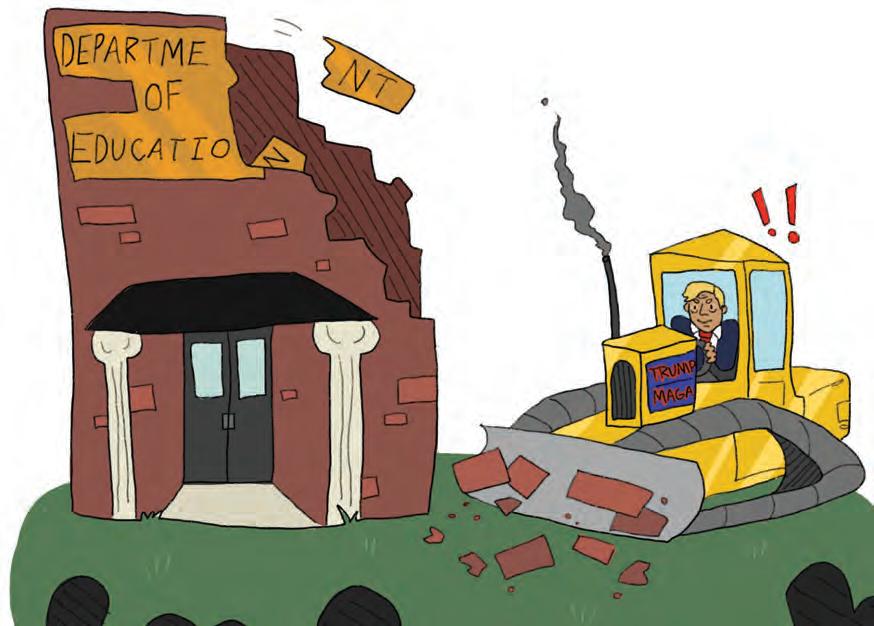
“(The) grants we get from the state, we may get the same amount of money, but we just don’t know yet,” CCHS Assistant Principal Everett Nealy said. “We haven’t gotten any guidance from the (Clarke County School District) as far as that goes.”
In the face of sweeping federal policy changes and a lack of clear state-level direction, school leaders, educators and families are left in a state of uncertainty, fighting to preserve the promise of equitable education for all.
Left: TEARING IT DOWN: An illustration depicts President Donald Trump tearing down the Department of Education. Through the elimination of the federal ED and Diversity, Equity and Inclusion measures, CCSD students educational opportunities are put in jeopardy. “The shift in authority from the federal to the state level may lead to a significant reduction in funding, resulting in fewer resources for under-served communities with programs like free lunch at risk,” Illustration by Sylvia Robinson


STORY BY JANE RIPPS Managing Editor
STORY AND LAYOUT BY WYATT MEYER Editor-in-Chief
ILLUSTRATIONS BY
KIMBERLY SANABRIA-AMAYA
Graphic Designer
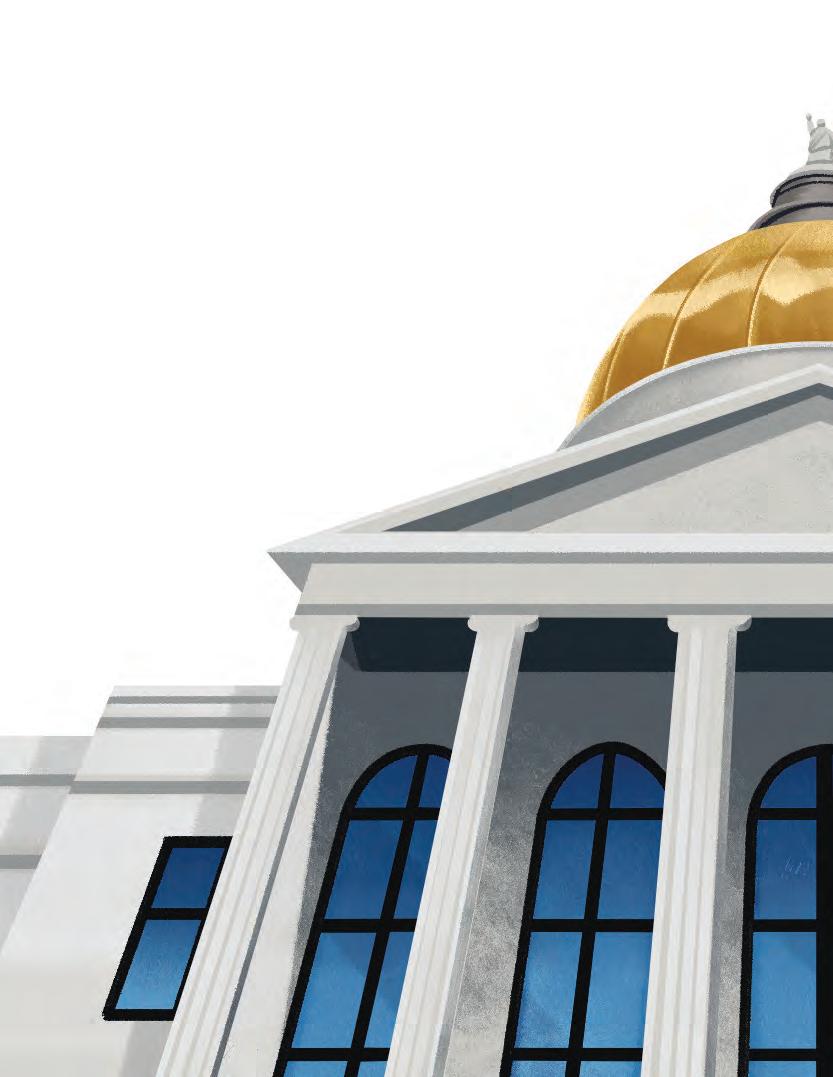
In his childhood home in South Mississippi, Spencer Frye, the State Representative for Georgia House District 122, grew up hearing stories from his grandfather about his walk to and from school.
His grandfather was usually alone, except for the consistent company of a hunting gun.
“When he would go to school, he’d carry a shotgun. He would get to the classroom, give his shotgun to the teacher and then (the) teacher (would) put it in the corner,” Frye said. “When he left school, the teacher gave him the shotgun back, and he’d hunt for food for dinner on the way home.”
Now a politician representing Athens and the surrounding area, Frye’s upbringing – hunting in the woods, watching classmates store guns in the back of their pick-up trucks and internalizing the stories of his family’s history – has cemented one lesson in his mind: the dangerous power of a gun.
“That’s the type of environment that
I came from, and I think it’s really important to recognize the specific amount of training I went through. That was not any sort of standard training that we have (the) opportunity today to take advantage of,” Frye said. “It was training that was drilled into my head by my family members (of) how to properly handle a firearm (that taught me) the best way not to shoot
Georgia lawmakers grapple with how to balance federal law and personal safety amidst rising gun violence rates within the state.
somebody is to not point the gun at them.”
Through his work in the Georgia General Assembly, Frye has grown to recognize the ways in which guns regulate and impact everyday life and how it has evolved past the basic Second Amendment right into a polarizing, political issue.
“As our society has gotten more complicated, we have basically, as a culture,
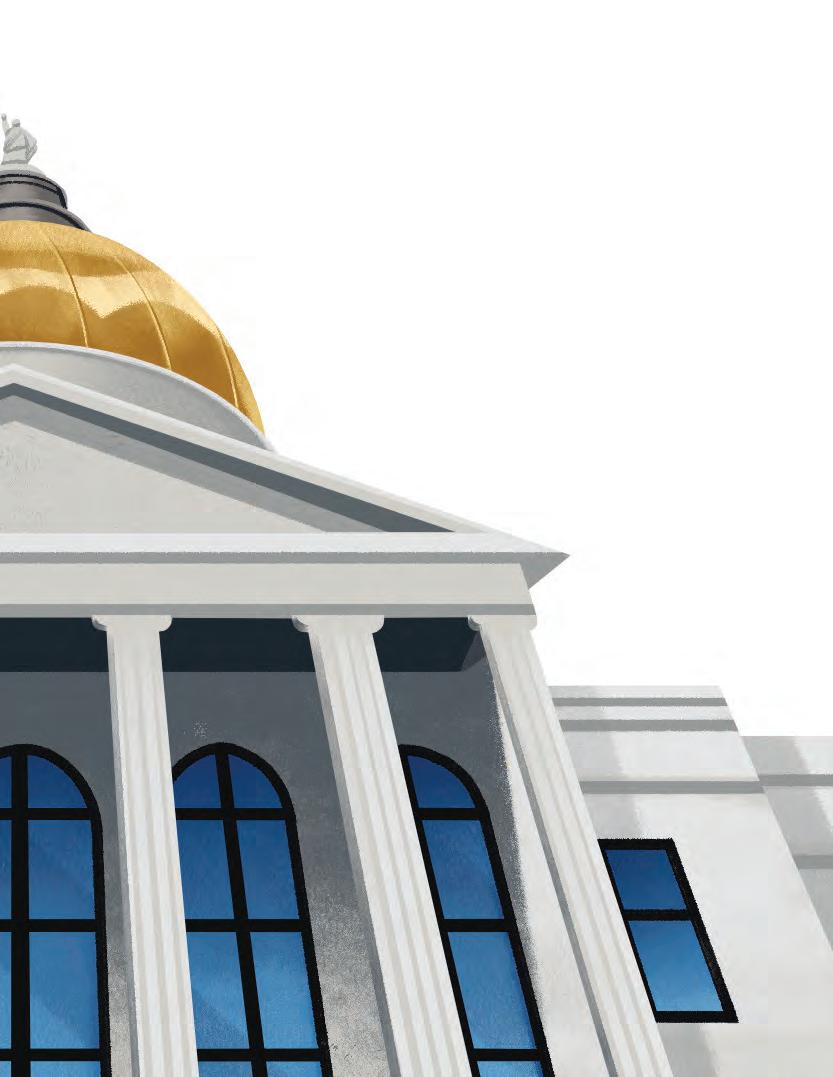
placed firearms on an altar,” Frye said.
As such, gun regulation has fractured along partisan boundaries, with laws varying wildly from state to state. Amidst the legislative dissonance, gun violence in public spaces has increased dramatically – especially in Georgia.
According to 2022 data from the Johns Hopkins University Center for Gun Violence Solutions, firearms were the leading cause of death among children and teens ages 1-17. The gun death rate increased 56% in 10 years since 2013. The state had the 8th-highest gun homicide rate in the country.
On a county level, some areas of Georgia have felt the effects more acutely than others, perhaps none more so than Barrow County. Even before the Apalachee High School shooting on Sept. 4, 2024, which saw two students and teachers killed, Barrow County had the highest firearm-assisted suicide rate in the state.
Georgia is not entirely unique in its struggle with gun violence – the increase is country-wide. However, in the Peach State, discourse stemming from the Apalachee shooting has cast the balance between personal liberty and protective responsibility in a new light, leaving legislators with a question: what now?



“I think Georgia’s laws are too loose,” Frye said. “A lot of legislators are unwilling to vote for a piece of legislation that requires training if you carry a handgun, (but) we require training for a driver’s license to drive a vehicle. North Carolina and Colorado require three to five hours of range training from a certified range instructor in order to get a carry permit. Why is that controversial?”
Georgia’s non-restrictive laws correlate with above average gun violence statistics across the board. According to the Centers for Disease Control, Georgia’s overall gun death rate and gun homicide rate rose 37% and 66%, respectively, each surpassing national increases. Georgia’s gun suicide rate rose 20%, slightly less than the 21% national rate.

Georgia is ranked 46th in the United States for gun law strength, as reported by the nonprofit gun advocacy group Everytown Research and Policy. Citizens are not required to undergo background checks or secure permits to purchase a handgun. Citizens don’t need a permit to carry a concealed weapon.
In Georgia, there is various pro-gun legislation in place, including House Bill 260, also known as the “Safe Carry Protection Act.” When it was passed in 2014, Georgia residents gained the right to carry in churches, bars and through Transportation Security Administration (TSA) lines at airports, among other establishments.
Georgia also has a Stand Your Ground law that states, “A person who uses threats or force relating to the use of force in defense of self, others, habitation, or other property has no duty to retreat and has the right to stand his or her ground and use force, including deadly force.” This allows a measure of legal protection for citizens who use guns in self-defense regardless of the circumstances of that defense, leading critics to call them “Shoot First” laws.

All incidents included, an average of 2,005 Georgians die from guns in a year – 905 from homicide, 1,035 from suicide.
Legislators from across the aisle have called out the problem, but efforts to change laws haven’t often taken effect. While many politicians, such as Frye, advocate for legislation requiring firearm training to purchase a gun as an effort to increase safety, Jason
“As our society has gotten more complicated, we have basically, as a culture, placed firearms on an altar.”
-- Spencer Frye,
State Representative for Georgia House District 122 (D)
Ridley, State Representative of House District 6 for the Georgia General Assembly, believes passing legislation with these requirements infringes on citizens’ Constitutional rights to carry.
“I think that (training) should be a choice, just like anything else. I don’t really like the government trying to tell us what we (can) do and what we can’t do. As far as the training issues, I think that should be a personal responsibility for a person,” Ridley said.
Of the 50 most common laws used to prevent gun violence, Georgia has four. Accordingly, Everytown ranks Georgia near the bottom of its lowest tier for gun safety: “National Failures.”



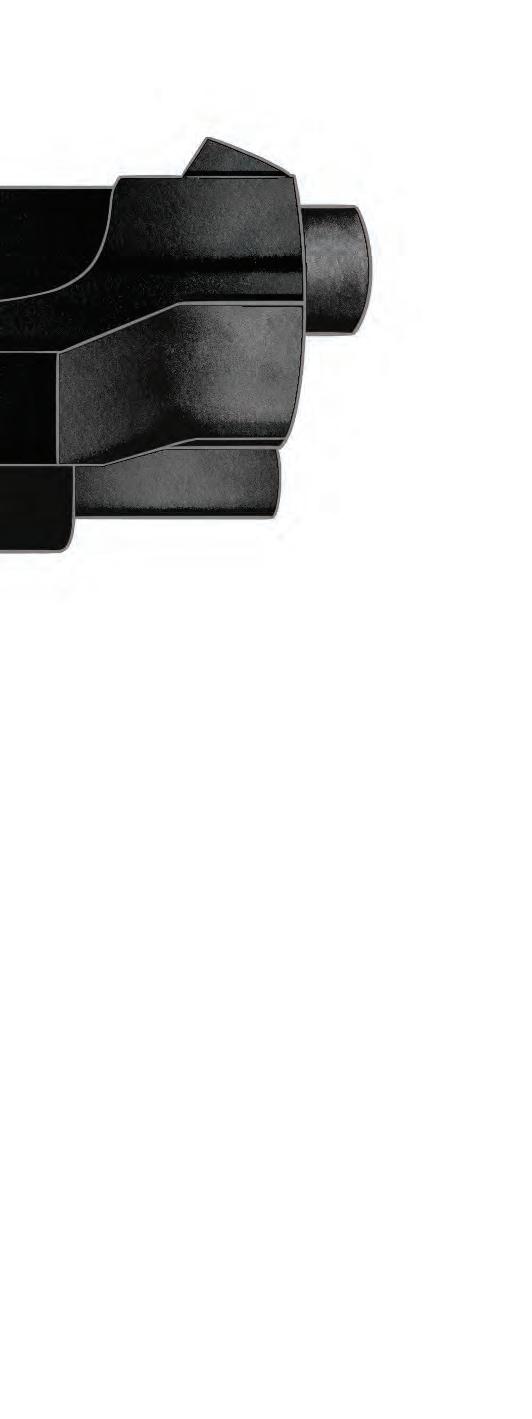
Gun violence in schools, particularly in high schools, was brought to the forefront of the public imagination by the 1999 Columbine High School shooting that left a total of 13 victims dead. The case was one of the most-covered story of the 1990s and holds an immense significance in popular culture.
Today, the word “Columbine” is synonymous with gun violence and songs like Foster the People’s “Pumped Up Kicks,” which was written about the
However, Dr. Jaclyn Schilkraut, the Executive Director of the Regional Gun Violence Research Consortium at the Rockefeller Institute of Government in New York, notes that Columbine wasn’t the first school shooting. Rather, it was
“Columbine showed that it could happen anywhere, especially suburban communities that historically have much lower rates of gun violence than urban areas,” Schildkraut said. “But, a lot of that was due to chance. Columbine was the first time we watched a shooting unfold live on air the way we are accustomed to seeing it today. Had that not happened, it likely wouldn’t have
I’ve ever heard.’”
In the face of this legislation, Knox was one out of the hundreds who took a public stance on the issue, becoming the face of Knox V. Georgia – the 2017 lawsuit filed by five University System of Georgia professors to block HB280 on the grounds that it usurped the Board of Regents’ authority under the Georgia consitution to govern, control and manage the USG and its member institutions.
After an almost six-year battle throughout the Georgia judicial system, the Georgia Supreme Court ruled against Knox in a 7-2 decision on May 31, 2023.
“I guess there’s a reason that you don’t speak out because you’re afraid you’ll be next. But how far are you going to get pushed in the corner before you do something? And so I just decided life was too short to not stand up for the right thing. I’d rather die knowing that I gave it a shot, even if it was a long shot,” Knox said.
An added wrinkle in HB280’s impact might come as a surprise – the potential for weapons brought onto campus to be stolen and then used in crime. According to Athens-Clarke County records as of April 29, since the start of 2022, there have been 365 documented instances of firearm thefts from motor vehicles in Athens. Some Republican lawmakers, such as Ridley, have pointed to the thefts as a reason for citizens to carry their weapons on their person.
“(People) come from North Georgia down to Athens (for football season), but there’s certain places you can’t carry guns in, so you leave them in cars, they’re broken into and those guns are used in crime,” Ridley said. “If I didn’t have to leave it in my car and I could keep it on my person, then that wouldn’t happen.”
“As far as the training issues, I think that should be a personal responsibility for a person.”
Broadly, the phenomenon is especially prevalent in Georgia. As reported by the Bureau of Alcohol, Tobacco, Firearms and Explosives, an average of 14,288 firearms were reported as stolen from citizens in Georgia each year between 2017 and 2021. Based on population, Georgia ranks fifth among states.
ACC Mayor Kelly Girtz acknowledges the prevalence of the thefts, but believes more regulation would cut down on both theft and violence.
“There’s not a wall between Downtown Athens and the University of Georgia where somebody’s checking for weapons,” Girtz said. “Every year, students drive onto campus with weapons in their vehicles that get stolen. If you’ve got an open carry situation, you’re inviting people to have weapons.”
-- Jason Ridley, State Representative for Georgia House
Fast forward more than 25 years, gun violence in the classroom – from kindergarten to university – remains relevant.
On July 1, 2017, Georgia House Bill 280 took effect across the state. HB280, also known as the “Campus Carry Law,” was signed by then-Governor Nathan Deal and authorized the concealed carry of handguns on the campus of any public university’s campus in Georgia and removed them from the “school safety zone.”
“There had been a policy against guns on the UGA campus that went back centuries. That was the policy of the University System of Georgia (USG), which comprises all the universities in the state,” Dr. John Knox, a University of Georgia Professor in the Department of Geography, said. “Everybody went along with (the bill). Even if the university presidents weren’t too thrilled with it, they weren’t going to say anything. I thought this was absurd, because it was incredibly poorly thought out, and still is.”

Frye, who voted against the bill, remembers an interaction a conservative family member who nonetheless expressed his distaste for the legislation.
“My uncle called me up and he said, ‘Spencer, what the hell are you boys doing over there?’ And I said, ‘What do you mean, Uncle Benny?’ He said, ‘How come this gun bill passed?’ Frye said. “I said, ‘Uncle Benny, I’m real sorry I had to vote against that bill. I just don’t think that that’s a good piece of legislation.’ My uncle from South Mississippi, with a gun cabinet built in his living room, said, ‘I’m so glad you didn’t vote for that bill, because that is the stupidest bill
1 2 3 4 5 Stand Your Ground Law Safe Carry Protection Act Campus Carry Law Felony Prohibitor
Allows the use of deadly force without first attempting to retreat.
Permits guns to be carried in a variety of establishments, including bars, churches and airports.
Mandates public universities to allow concealed carry of weapons on campus.
Prohibits people with felonies from purchasing firearms indefinitely.
House Bill 268 (In progress)
Would establish behavioral threat management teams in schools to handle students who threaten violence.

Much of what captures public attention about gun violence is mass shootings, as the media often reports on the scale and magnitude of the crisis. As such, experts have suggested a “general imitation” effect applied to mass shootings, wherein extensive media coverage of the perpetrators and event leads others to imitate the behavior.
In Georgia, following the Apalachee shooting, threats of further violence sprung up around the state – including a middle school student in the Clarke County School District on Sept. 5. However, Schildkraut maintains that putting mass shootings in context is crucial to preventing the broader problem of gun violence.
“If you think about all of the crimes law enforcement encounters in a given year, homicides (of any kind) represent 0.1% of those. Mass shootings make up 0.1% of that 0.1%, meaning that they basically account for 0.01% of all crimes known to law enforcement in a given year,” Schildkraut said. “Other types of gun violence, like firearm-associated suicide, is far more common than mass shootings or even gun homicides. (Mass shootings) are the rarest form of gun

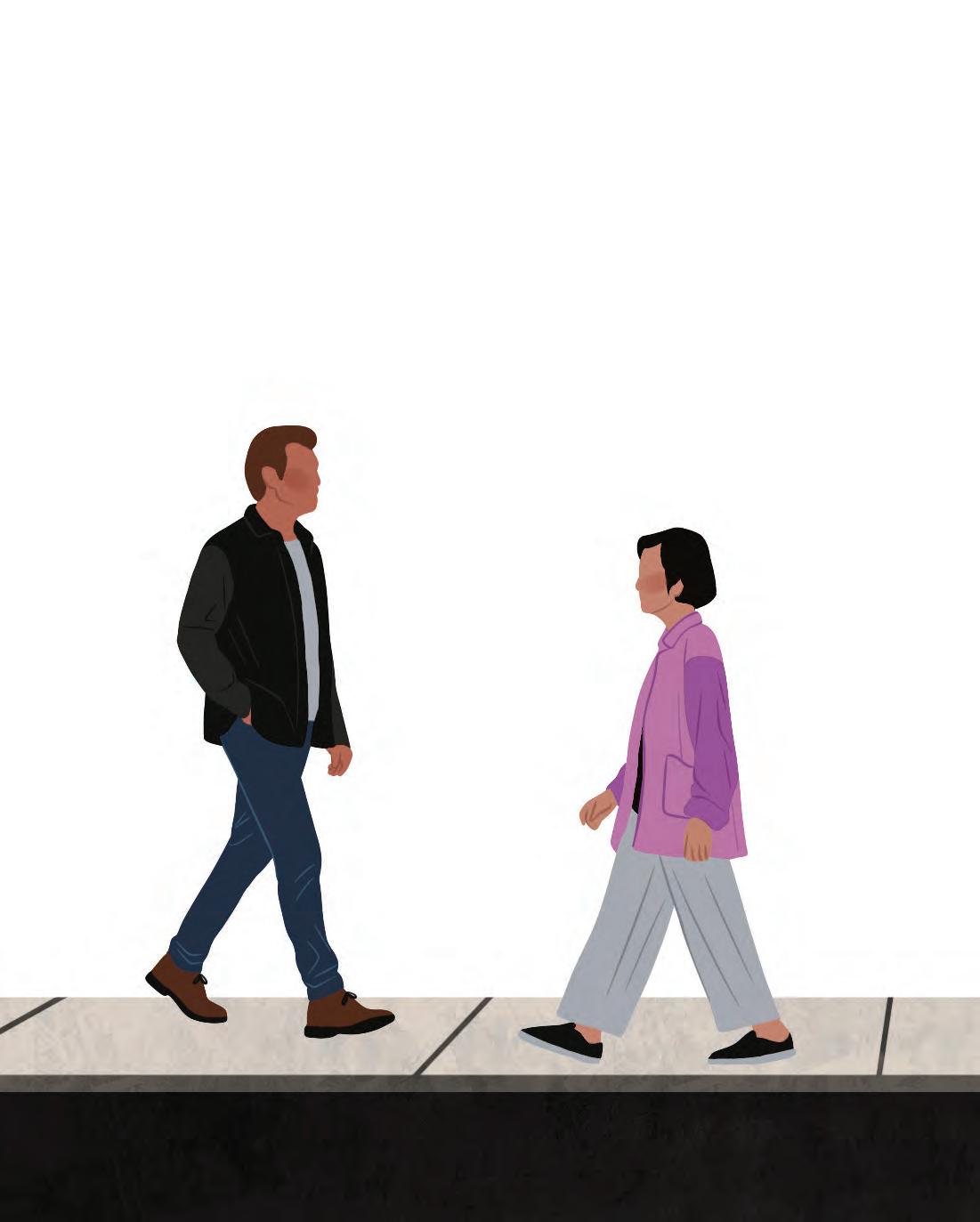
violence that happen to get the most attention.”
A uniting factor between most types of gun violence has been mental health. Where regulatory discussions have stalled, Georgia politicians have been active in passing bills like House Bill 268, which calls for school systems to set up a behavioral threat management team that’s to intervene when school officials learn that students have threatened violence.
Passed by a 159-13 vote on March 4 and moved onto Senate vote, the bill, which has not yet been signed into law, has undergone multiple revisions but
“(Mass shootings) are the rarest form of gun violence that happen to get the most attention.”
-- Dr. Jaclyn Schildkraut, Executive Director of the Regional Gun Violence Research Consortium



has bipartisan support. For Frye, the legislation may be a start to detangling the complex web of gun violence causes, but the solution doesn’t begin and end with mental health.
“There’s not one magic bullet that can solve any problem, right? It’s a group of solutions put together that will make our lives safer and our children safer,” Frye said. “That’s going to be through a combination of us paying attention to our mental health, finally, as an issue like a disease, and then the institution of safe gun ownership.”
“I feel like not enough is being done to prevent this from happening.”

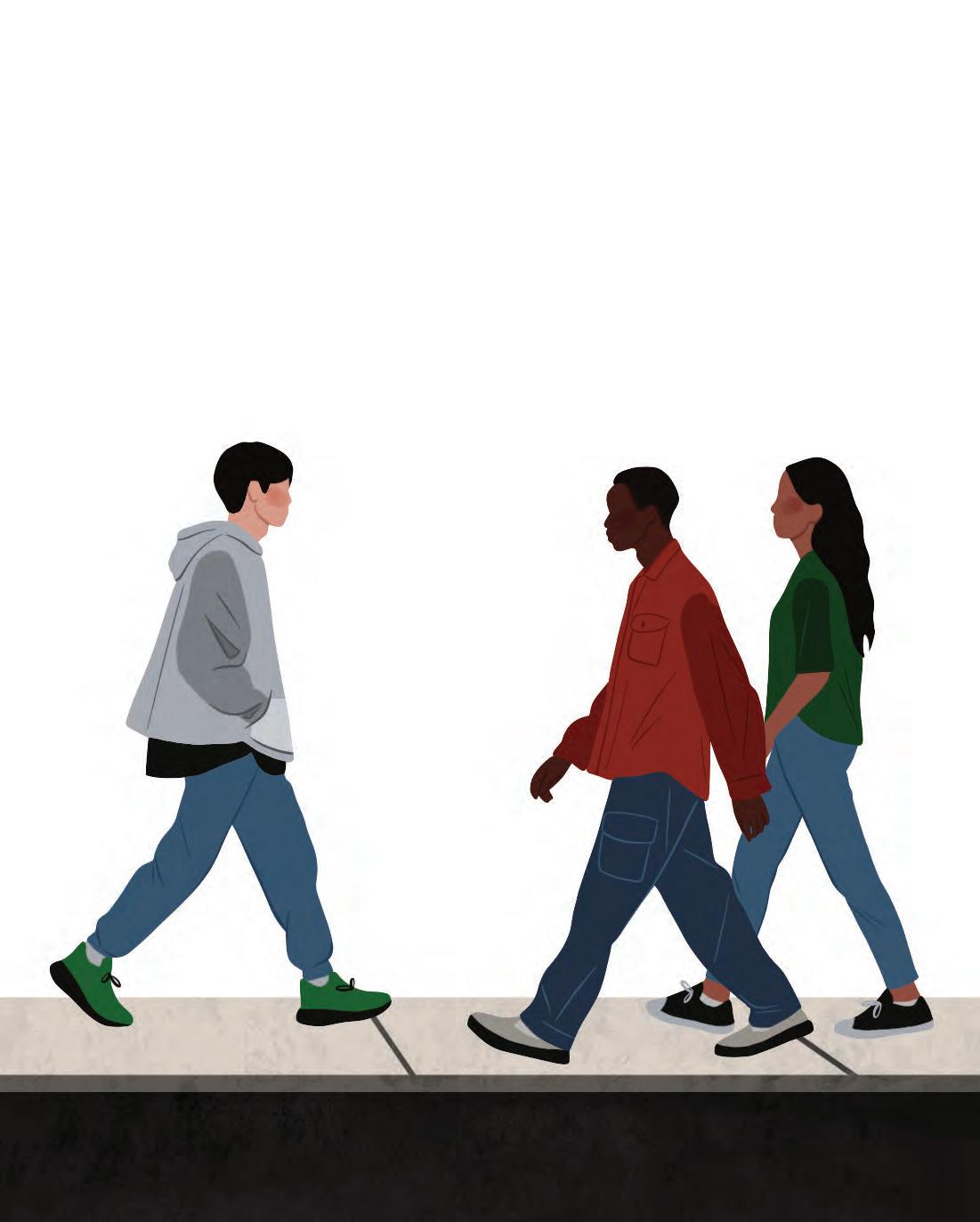
-- Carlie Holmes, CCHS junior
Outside of the legislative sphere, students like CCHS junior Carlie Holmes feel the effects of the country’s lack of regulation.
“I think it should be way harder to get weapons. That’s part of why all of this is happening, because it’s so easy to get your hands on guns so quickly,” Holmes said. “As far as mental health for students and gun regulation and control, I feel like not enough is being done to prevent this from happening.”
Holmes’s sentiment is echoed in the current political climate, where efforts to encourage safe ownership and not limit it continue to be struck down.
“There’s a lot of guns already out there, and you can’t prevent that, but we can mandate. I’ve actually had a piece of legislation that mandated insurance policies added to homeowner policies if there was a firearm in the house,” Frye said. “I think it’s a combination of things that are going to help us get to where we need to be.”
As conversations continue regarding gun violence in places as disparate as the Georgia General Assembly and Frye’s Deep South family home, Girtz is left with a question – not an answer – about what happens next.
“Connecticut has a third of the gun death rate of Georgia, so three times as many people die by a bullet in Georgia as in Connecticut,” Girtz said. “Same nation, the same US Constitution, the same Second Amendment, but doing some smart things on the regulatory front. Why wouldn’t we want to keep more of our friends and neighbors and loved ones alive?”


CCHS
senior Daniel Castro’s
affinity for stories has connected him to his community.
STORY
AND LAYOUT
BY EMLYN MCKINNEY News Staffer
Ayoung man strides into class and immediately greets his teacher, grinning from ear to ear. Within a moment, the student, Clarke Central High School senior Daniel Castro, has unknowingly managed no small feat: capture the attention of an entire classroom.
Castro’s 100-watt smile spreads across the faces of the students as he introduces himself, discussing his plans after high school with such sincerity that will leave the class buzzing about his personality for days afterward.
Though he may deny it, the attention isn’t unearned. From Castro’s contagious smile to how gestures with his hands as he talks, every word out of his mouth feels like the beginning of a story, no matter if it’s a debate in his Advanced Placement Spanish class or a retelling of his adventures as a mischievous 13-year-old.
“I will say I’m a storyteller. I love to speak about me, speak about Colombia (and) speak about my life, too.”
-- Daniel Castro, CCHS senior
But these stories aren’t just words. Each of Castro’s anecdotes allows him to connect with his community.
“I will say I’m a storyteller. I love to speak about me, speak about Colombia (and) speak about my life, too,” Castro said.
Following Castro and his immediate family’s immigration to the United States from Colombia in 2021, he attended North Oconee High School, where he met English for Speakers of Other Languages English department teacher Alicia Richwine.
“I never (want my children to) forget where we come from, because one of the (things) that I feel all the time is (people have) lost contact.”
-- Briyis hahn, Daniel’s Mother and Oglethorpe Avenue Elementary School Dual Language Instruction Program teacher
While taking her class during his freshman and sophomore years, Castro found a way to share his stories in a new language.
“As (Castro) acquired more English, (he) was more capable of expressing himself clearly and being able to refine what he wanted to say or write,” Richwine said. “He was always open and willing to put himself out there to try to say or write in English.”
Castro started school at CCHS at the beginning of the 2024-25 school year and immediately left a huge impression on CCHS foreign language department teacher Dr. Javier Soler after a firm handshake and an introduction. While recounting the moment, Soler couldn’t help but smile.
“The first day (Castro) introduced himself, he was saying, ‘My name is Daniel Castro. Do you want to hear my second last name?’ (I said,) ‘Yes.’ ‘Guevara.’ ‘OK.’ It’s like someone whose last name is ‘Washington-Jefferson,’” Soler said.
Castro’s stories don’t stop at school though. His home has also become a space for him to connect with his family, especially his mother, Oglethorpe Avenue Elementary School Dual Language Instruction Program teacher Briyis Hahn. From screen-less family dinners to attending community events, Hahn has continued to emphasize the importance of a communicative and strong community.
“We can speak together and speak frankly, no filter.” Hahn said. “ He is very human and sensitive person. He is very considerate because he knows our history, he knows I am working hard, and he tries to support me in the ways that he can.”
And so, Castro believes that every memory — every introduction, every connection, every story — is what makes him, him, not just the charismatic and earnest demeanor he shows at first glance.
“I am a person who thinks you are what you lived. The experience you had in life is what marks you,” Castro said. “If I clone myself, he would not be me, because he doesn’t have my experiences. He may have my DNA, but he doesn’t have my core memories. You are what you remember (and) experienced, good or bad.”
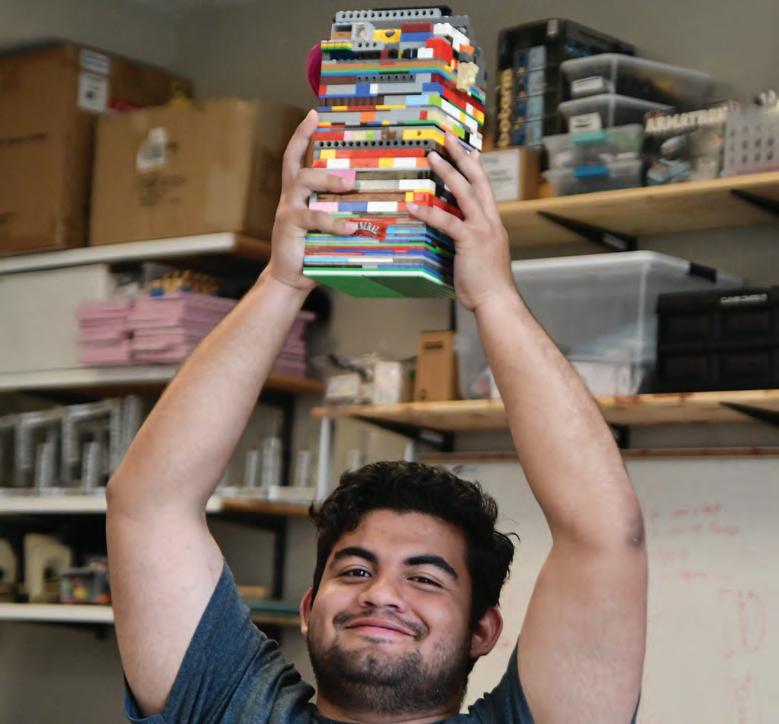
consistent effort to practice English during the two years he spent in her class. “Some students are very hesitant to try pronouncing the words or sounds that give them trouble and don’t really want to do that in front of other people,” Richwine said. “(Castro wasn’t) embarrassed by mistakes, but willing to work until he (fixed) them.” Photo by Grady Dunston
want (to just text)
my friends because I want to listen. Are you sad? Are you happy? One of the things that my daughter (does) is speaking (on) FaceTime because (Castro agrees) with me that he wants to see her, listen to her, look at her expression.” Photo courtesy of Briyis Hahn
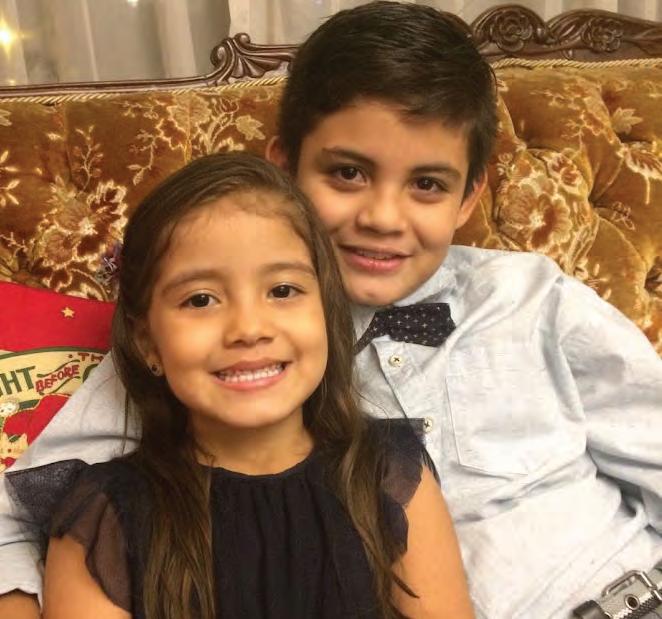
By Adrian Rangel, as told to Sasha barkan
The QuestBridge scholarship, along with the financial aid that the universities will give you, gives guaranteed admission, which makes QuestBridge really distinctive. It’s another application which universities have listed under the application portals. QuestBridge, it’s a whole separate cycle, and allows you to get in front of your peers in putting your application into these offices.
(QuestBridge) lets you know that there’s not only one path, there’s a bunch of paths, a bunch of opportunities, a bunch of chances to be matched somewhere and you shouldn’t be stressed about the process. You should be focused. I would put it simply: it would be to not focus on the outcome, but focus on the application itself, since that’s what’s going to matter the most.
Questbridge looks at the bigger picture. It’s not all about stats. It’s not all about your extracurriculars. (They evaluate) everything in context. Explain your situation throughout high school. Explain how it’s affected you. Have you grown from it? QuestBridge will see that. The colleges will see that. They also see this in the context of extracurriculars. You may not have all the access to all (extracurricular) opportunities (and) they will understand that.
Applicants usually come from a low-income background. The standard that Questbridge has is $65,000 per family of four. If you excel academically (and) have good extracurriculars, then (you should) apply.
The process of ranking schools comes before and after you become a finalist. (You put) your top choice, your second choice, third choice and so on. You send in one application to all these schools. They all receive the same thing, and they’ll send you application portals which have things that update you on materials that are missing.
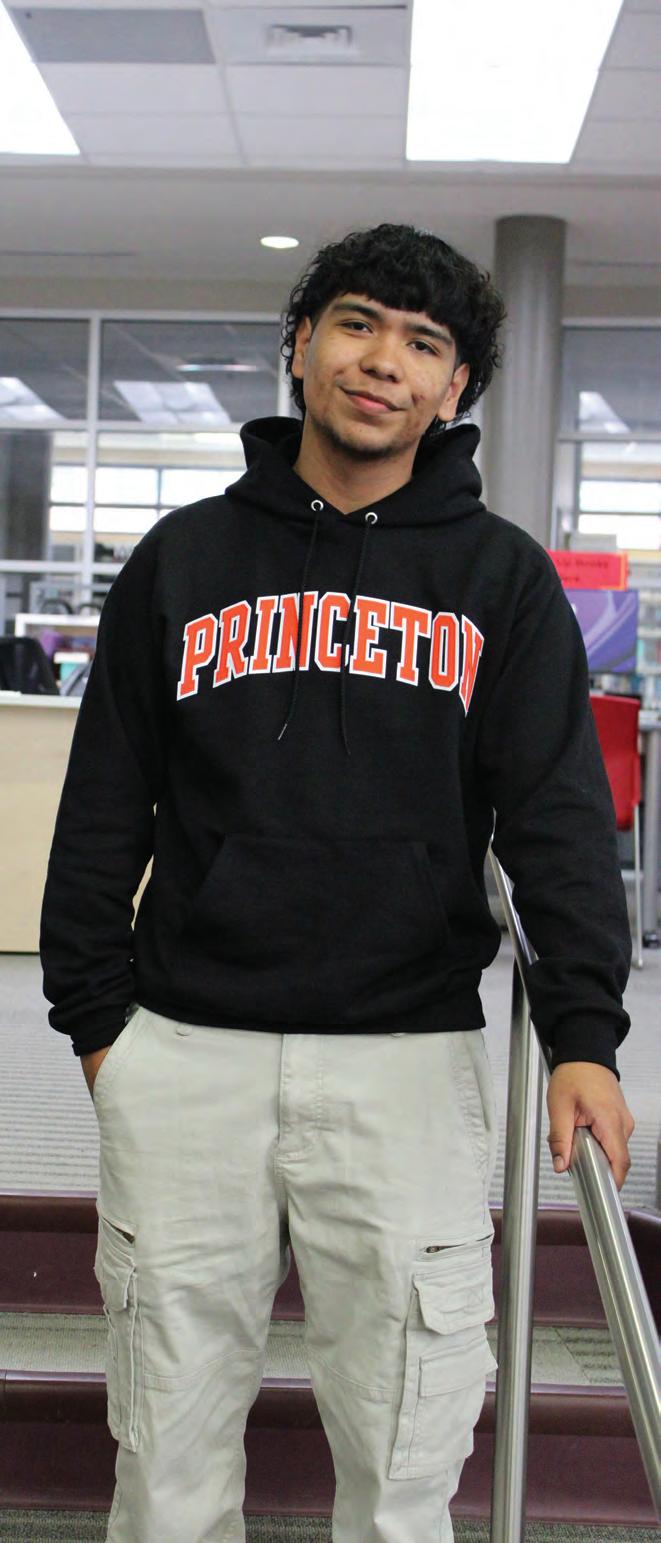
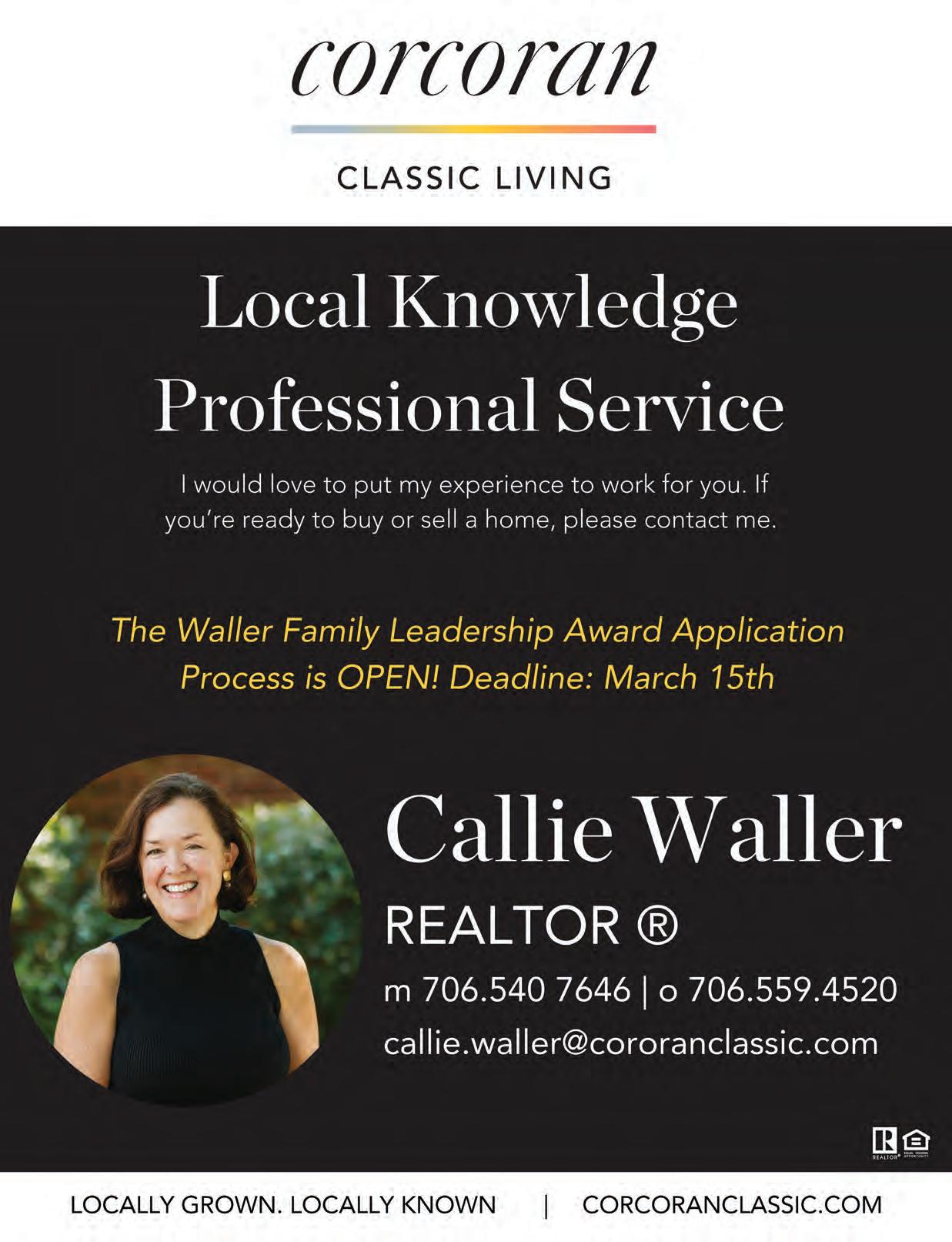
Since the rise of social media, users have developed a sense of entitlement towards celebrities, which has led them to exhibit invasive and even dangerous behaviors.

BY ADAH HAMMAN Variety Editor
When the news broke in 2014 that Canadian singer Justin Bieber and American singer and actress Selena Gomez were dating, fans flocked to social media to express their opinion on the couple.
Whether or not someone was on #TeamJelena, though, Bieber and Gomez’s relationship had gained national traction, one of the many examples of a celebrity pairing to do so.
When the two decided to end their relationship in 2016, they attracted even more attention, especially when rumors began to circulate that Bieber was dating American model Hailey Baldwin. Celebrity news outlets released article after article, generating thousands of comments, both positive and negative, which resulted in the former temporarily deactivating his Instagram account for a short period of time.
A significant moment in the debate regarding fan-celebrity relations occurred on Feb. 21, 2007, when American singer Britney Spears attacked a paparazzo’s car with an umbrella after months of relentless stalking. This incident marked an important turning point in celebrity culture and sparked discussions about the implications of fame. In the information age, what did the public have a right to know?
For almost 20 years since Spears’s bust up, the answer to that question seemed to be almost everything. But recently, celebrities have begun to speak out and advocate for their right to set boundaries. American singer-songwriter Chappell Roan, a rising pop star with a large social media presence, posted to the app in August 2024 to call out fans who she described as exhibiting “creepy behavior.”
Fans must learn to recognize that celebrities are entitled to privacy, just like anyone else.
But why? Why were people so enthralled, so invested in Bieber and Gomez’s relationship?
Since the rise of the internet in the 1990s and the advent social media apps like Instagram and X’s rise in popularity during the mid-2000s, celebrity culture has become more interactive, allowing fans to directly engage with their favorite artists. This has led them to develop an unhealthy sense of entitlement, where fans believe they have the right to influence celebrities’ personal lives.
“I don’t care that abuse and harassment, stalking, whatever, is a normal thing to do to people who are famous or a little famous, whatever. I don’t care that it’s normal,” Roan said in the now-deleted video.
Spanning decades, these incidents -- Gomez’s, Spears’s, and Roan’s -- highlight a growing need for society to reconsider its relationship with fame and the people who live in the spotlight.
Fans must learn to recognize that celebrities are entitled to privacy, just like anyone else. This starts with a collective change in behavior: think before commenting, avoid engaging in divisive online discourse, and respect when celebrities express the need for space.
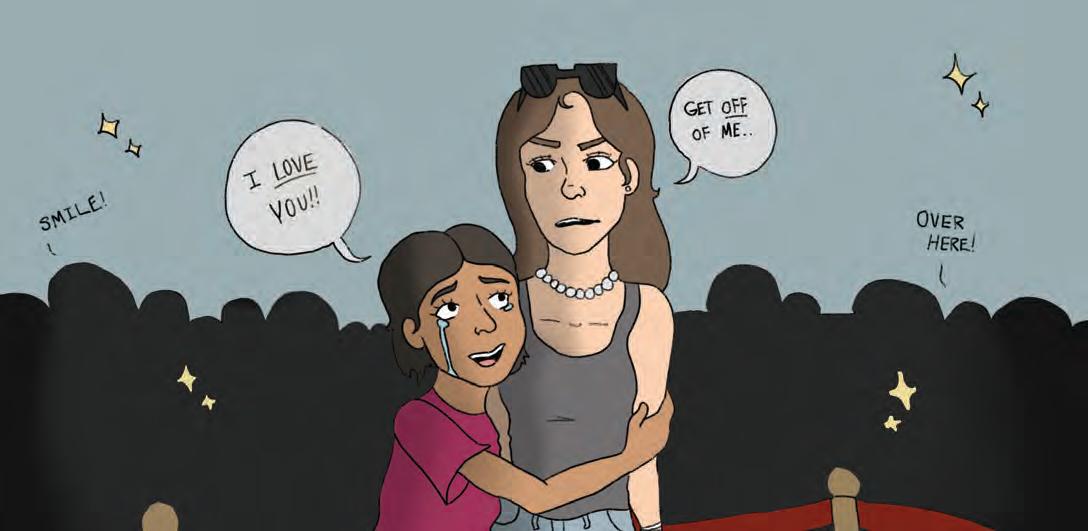
Featured: AUTHOR VISIT: Irish author Ferdia Lennon speaks to Clarke Central High School students during an iliad Literary-Art Magazine moderated Q&A in the CCHS Media Center on March 26. Having travelled from the United Kingdom, Lennon’s visit was his first time in an American high school. “I was really impressed with the questions from the audience and that engagement. It seemed like quite a few of the students were interested in the creative process. (They) either were writing or hope to write or plan to write, and that was lovely to see,” Lennon said. “I hope that they found (the Q&A) engaging, that if they want to write that it maybe helps them a little bit to think that writing is something they could try to do.”
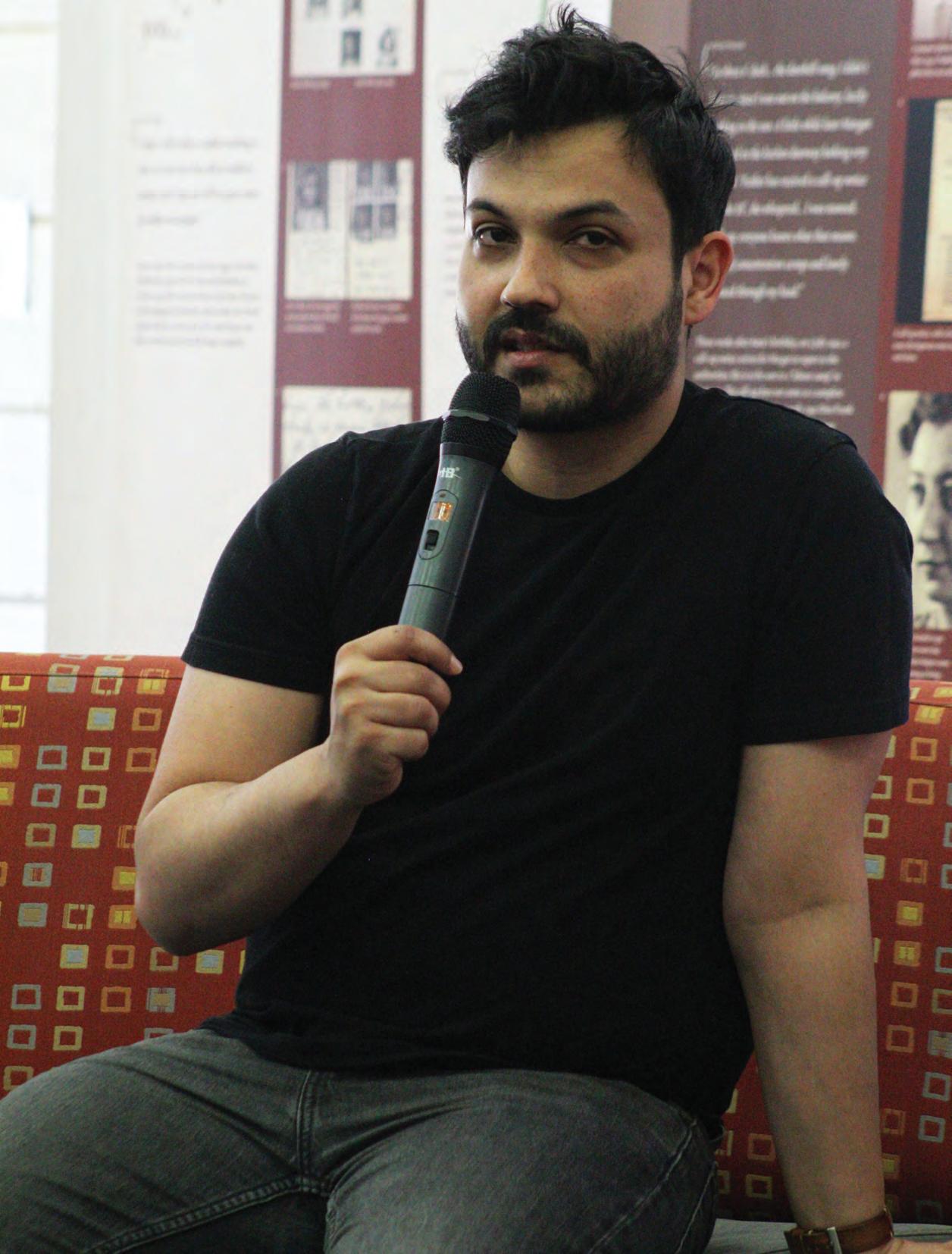
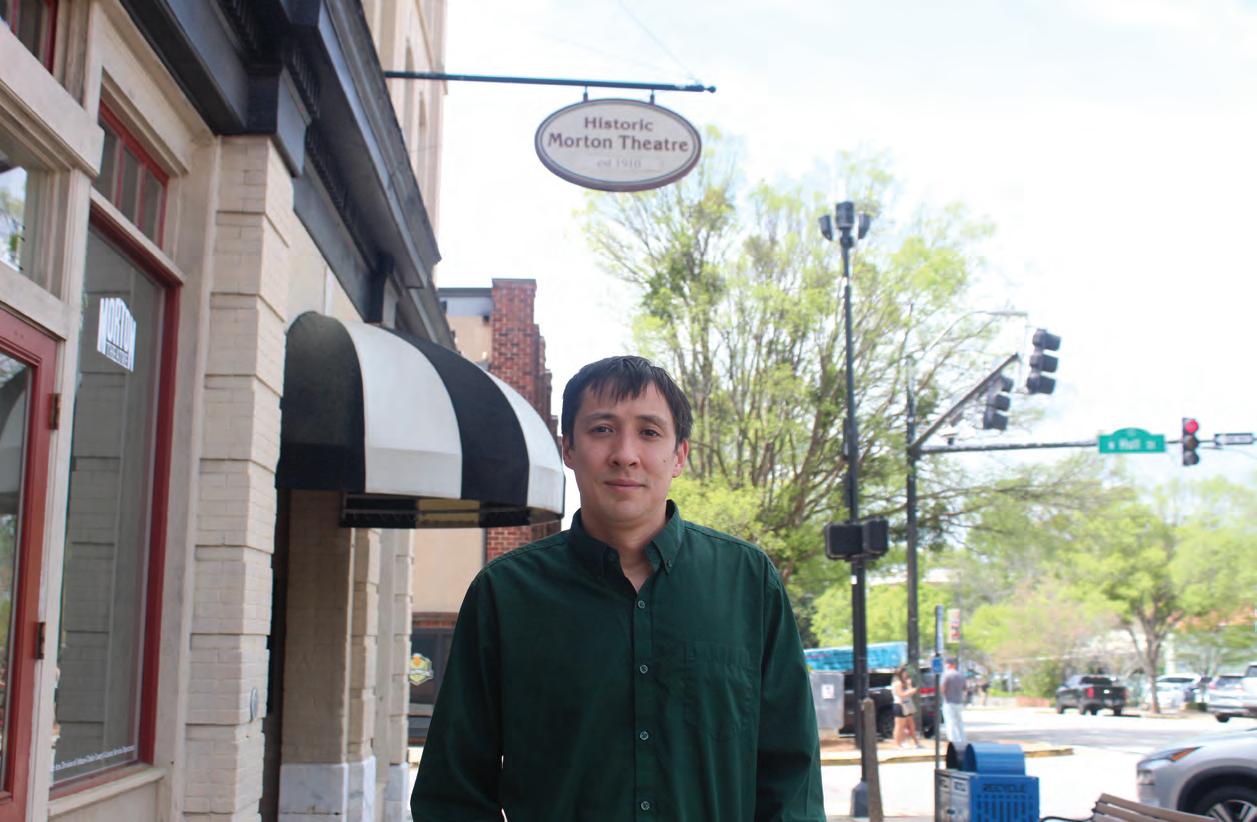
In 2024, Chuck Griffin created the Athens Film Festival as a way to promote filmmaking in Athens. The festival is continuing into 2025, taking place downtown on Aug. 14-17.
STORY BY ABIGAIL HOLLOWAY
In Athens, a town driven heavily by the arts, with murals all around the city and a robust music scene, what is missing? Chuck Griffin found the answer: a film festival.
“(Athens is) a festival town but there was a long period of time where we hadn’t seen a film festival. I’m from here, and I was a film student at UGA, and it just seemed like the perfect opportunity, especially with the film industry growing in Georgia,” Griffin said. “The idea of a film festival really spoke to me, (and) when I realized all those things, I was definitely compelled to start one.”
When planning the festival, Griffin wanted to garner a wide range of films. To do this, he founded the Automatic Film Society, a nonprofit that pays filmmakers submission fees. This gives the festival goers an opportunity to see a wide selection of films they might not have seen if filmmakers had to pay to submit.
“Making (submitting) free, just technically allows you to be more visible to the rest of the world. If you didn’t make it free, a lot of countries or filmmakers in other countries, like Germany or France, wouldn’t really give your festival a
“(Athens is) a festival town but there was a long period of time where we hadn’t seen a film festival.”
-- Chuck Griffin, Athens Film Festival Founder
second glance, they may choose one in their own country,” Griffin said.
The festival is open to all genres of films, from horror short films such as “A Terrible Place” to documentaries like “Finding Purpose: The Brookwood Story.”
Because of the variety of films that are accepted, Griffin saw a wide range of Athens-based films that drew inspiration from other prevalent forms of art in
Athens.
“We’ve got a couple of documentaries about dance (and) local music videos, it just speaks to all those different creative fields that Athens already kind of has a strong hold on,” Griffin said.
“The hype of (opening night) and the excitement that everyone had around (the movie) was really exciting for me,”
-- LAUREN MUSGROVE, Athens Film Festival Board Member and “Ugly Sweater” Director
The first festival took place between Aug. 15-17, 2024, Griffin hoped to foster a supportive community around filmmaking in Athens, growing a film scene to coexist with Athens’ already established focus on music.
Once the films are submitted, the Film Festival creates a schedule to show the films at venues all around Athens during the festival. Last year’s festival showed films at Ciné, Flicker Theatre & Bar, The Globe and the Morton Theatre.
Last year’s festival kicked off its opening night with the film “Ugly Sweater.” Lauren Musgrove, the director of “Ugly Sweater,” found this to be a huge success for her and her movie.
“The hype of (opening night) and the excitement that everyone had around (the movie) was really exciting for me,” Musgrove said. “The biggest thing that I got from the Athens Film Festival was the crowd reactions. I feel like every single moment, whether it was funny or intense, we could hear the crowd react to everything. That was the experience that every filmmaker wants to have for their project.”
The festival rounds out the three days with an award ceremony. Here, films can win awards such as Best Feature and Best Animated Short. The film “Chessboxer” won the award for Best Georgia Short Film. Eliseo Arreola, an actor from the film, also experienced the high-energy environment that came with the film festival.
“To be a participant in the first Athens Film Festival was really neat and then winning Best Georgia short was a cherry on top,” Arreola said. “It was such a great time being there amongst fellow filmmakers and actors and people that are just fans of cinema.”
The success Musgrove saw with the festival encouraged her to take a larger part in planning the festival this year, she hopes to create an environment that helps filmmakers promote their works to a larger audience and feel the same energy that her and Arreola experienced.
“We’re adding this pitch fest, which I’m coordinating, and that’s going to be allowing filmmakers to come together to network and practice pitching future projects,” Musgrove said. “That’s such an under-practiced art form in this industry, being able to sell your film idea to collaborators and investors and everything before you make it.”
This year’s festival will be held Aug. 14-17 where Griffin hopes to see this year’s festival continue the vibrant audience culture that was felt at the first festival’s screenings.
“My philosophy is a festival speaks for itself; filmmakers go there to be inspired, audiences go there to be inspired to be involved in film, whether it’s to watch more film or make film on their own,” Griffin said. “Outside of that, we’re definitely involved with (the) community, and want to host more screenings, partner with organizations and maybe have a local film.ssss
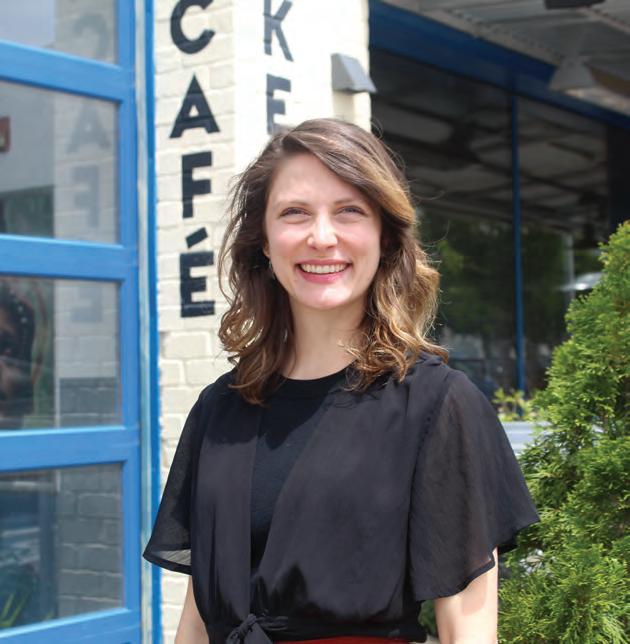
“That
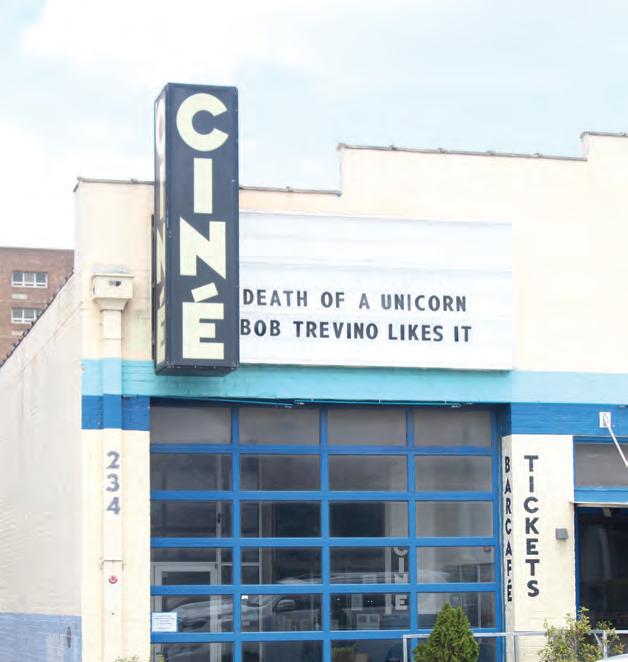
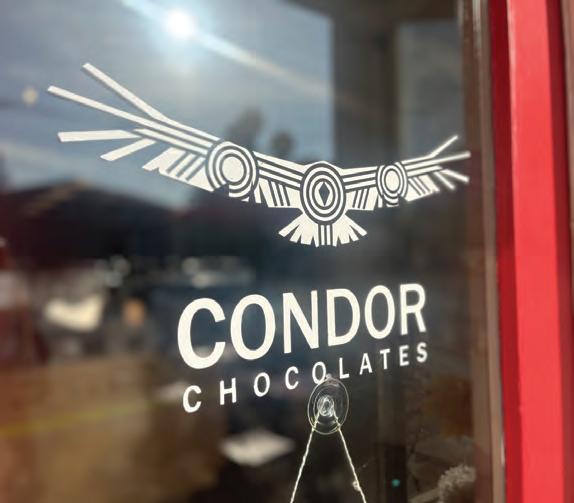
BY LIYA TAYLOR Social Media Coordinator
Located in Five Points at 1658 S. Lumpkin St., Condor Chocolates is a cozy, locally-owned cafe, specializing in handcrafted beverages and treats.
The cafe, one mile away from Clarke Central High School, offers customers an assortment of chocolate goods. The employees greet each customer as they walk in with a welcoming smile.
Priced at $6.50, the cafe’s chocolate milkshake is a delicious treat. Made with Ecuadorian chocolate, the milkshake is rich, visually-appealing and has a perfect amount of sweetness. The decadent chocolate flavoring, however, is disturbed by a slightly icy consistency. Some sips come up perfectly smooth in texture, while others are broken up with tiny chunks of ice.
The cafe, itself, is inviting and welcoming, with a warm interior and a front wall of windows that fills up the space with natural lighting while the rich scent of fresh chocolate fills the air. However, one potential downside is the limited seating, especially during weekends when the cafe tends to get crowded.
Nonetheless, Condor Chocolates remains a charming and worthwhile spot for those looking to treat themselves with a high-quality chocolate milkshake.

5

After trying milkshakes from around Athens, ODYSSEY staffers conclude that Clocked and Condor Chocolates offer the best chocolate milkshake. Above: AN EXCEPTIONAL SHAKE: Condor Chocolates chocolate milkshake is
9 7
8.5 9 10 O
BY CESIA MARTINEZ Variety Staffer
Located in Downtown Athens at 259 W. Washington St., Clocked is a retro-style diner that serves a variety of American classics, including burgers, fries and sandwiches. Open daily from 11 a.m. to 10 p.m., the restaurant instantly immerses customers in a wave of nostalgia with its ‘90s-themed decor, colorful accents and funky details. Dim lighting and booth seating add to the cozy, laid-back feel, making it a fun place to hang out with friends or enjoy a solo meal.
Among the standout menu items is Clocked’s chocolate milkshake. Priced at $8.75, the milkshake may seem expensive at first glance, but the quality and portion size make it worthwhile. Served in a tall glass and topped with a generous swirl of whipped cream, the drink is thick and velvety with a rich, chocolate flavor that doesn’t overwhelm the palate. Each sip strikes a satisfying balance between sweetness and creaminess, making it a memorable treat. While the dim lighting may not appeal to everyone, the overall atmosphere is welcoming and unique. The combination of vintage charm and bold flavors makes Clocked a go-to spot for anyone in search of a classic milkshake experience. For those willing to spend a little extra, the chocolate milkshake is a satisfying and nostalgic indulgence, especially on a hot summer day.
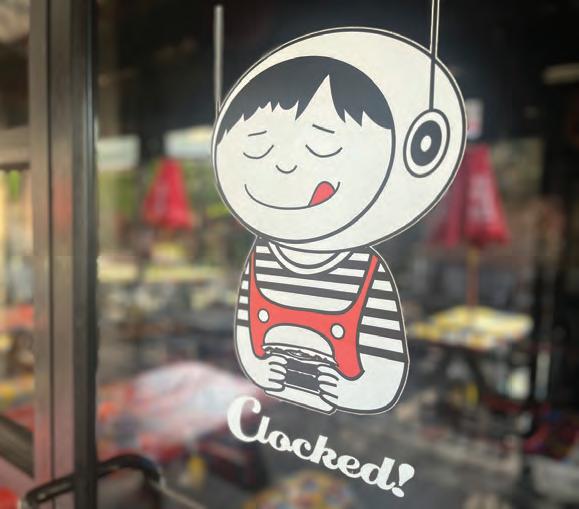


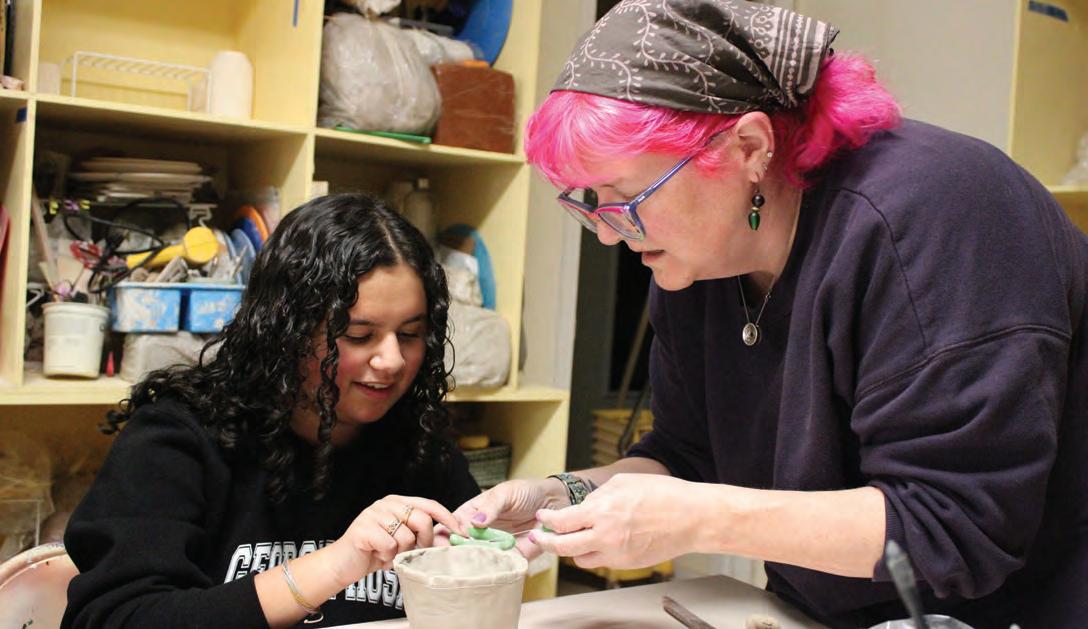
As I stepped into Good Dirt Clay Studio, the thick scent of clay hit me. Around the workshop, shelves were decorated with pottery as people worked on the wheel and sculpted clay with their hands. Having never worked with clay before, I felt intimidated by the accomplished bustle of the place -- I didn’t think I was capable of the skillful focus I saw around me. Nonetheless, I was determined to give it a try.
I met my instructor, Dr. Elise Robinson, and we went to another room to start working on our pieces. I hadn’t thought as far as what I wanted to create, but I thought of doing a mug since it seemed easy enough compared to the large bowls and intricate sculptures everyone else was making.
The
floral patterns into the mug, using them to express my personality on the cup. After carefully adding the flowers, I began to paint over the mug with a soft blue that mirrored the vibe of the flowers.
This part was my favorite: as I painted, the formerly intimidating environment around me suddenly became more peaceful and welcoming. The thick scent of clay hit me again, but this time, it didn’t feel strange, but a scent that I was used to already, like back in first grade when I played with Play-Doh for the first time.
whole time i was working on the mug, i was only focused on the mug, and nothing else.
As I molded the clay, I felt myself gaining confidence -- I slowly began to recognize a mug-like shape from the previously formless material. Just as I thought I was finished molding it, though, I made a mistake -- a dent in the handle the size of my thumb. I felt embarrassed for a minute, thinking my fears of artistic inadequacy had been realized, but before I could feel distressed, Elise showed me how to push it back into shape. The ease at which my heavyhanded mistake was fixed surprised me, giving me confidence as I moved on to decoration.
I decided to decorate the mug in two stages -- first, I used stamps to imprint
As I zoned in, focusing only on the painting process, the reason for my calm hit me. While I was working, I was focused on the mug, and nothing else. I felt undisturbed. All of my stress and worries disappeared because I’d enjoyed what I was doing so much. I looked up and saw the same thing with the other people there. Where before I’d been intimidated by their expertise, I now understood -- they were feeling that serene calm that I’d just been introduced to.
Although the experience wasn’t very long, I enjoyed making pottery and trying something that I hadn’t done before. Leaving the studio, I no longer felt intimidated by clay, or art in general. Instead, I understood that, regardless of skill and ability, the true value of art was the beauty of the process.
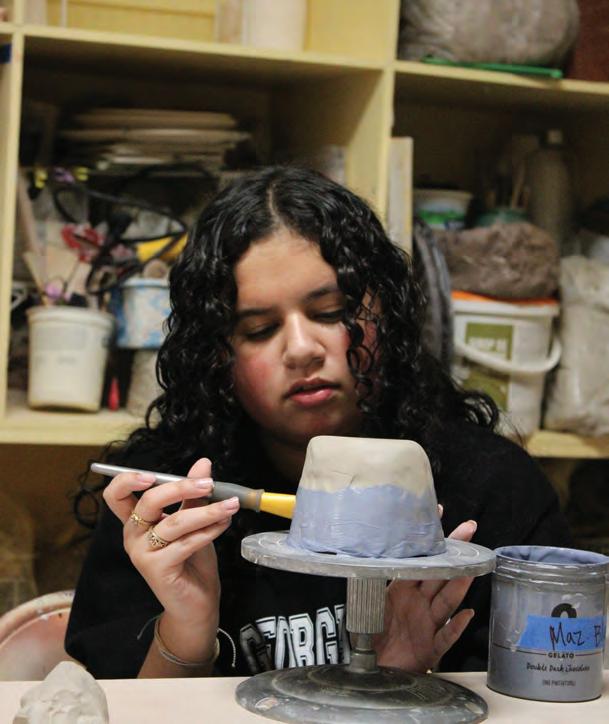
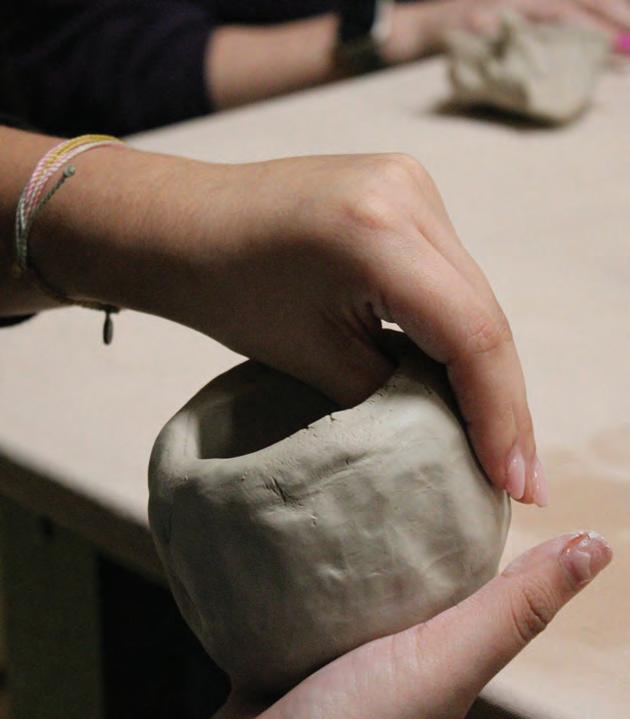

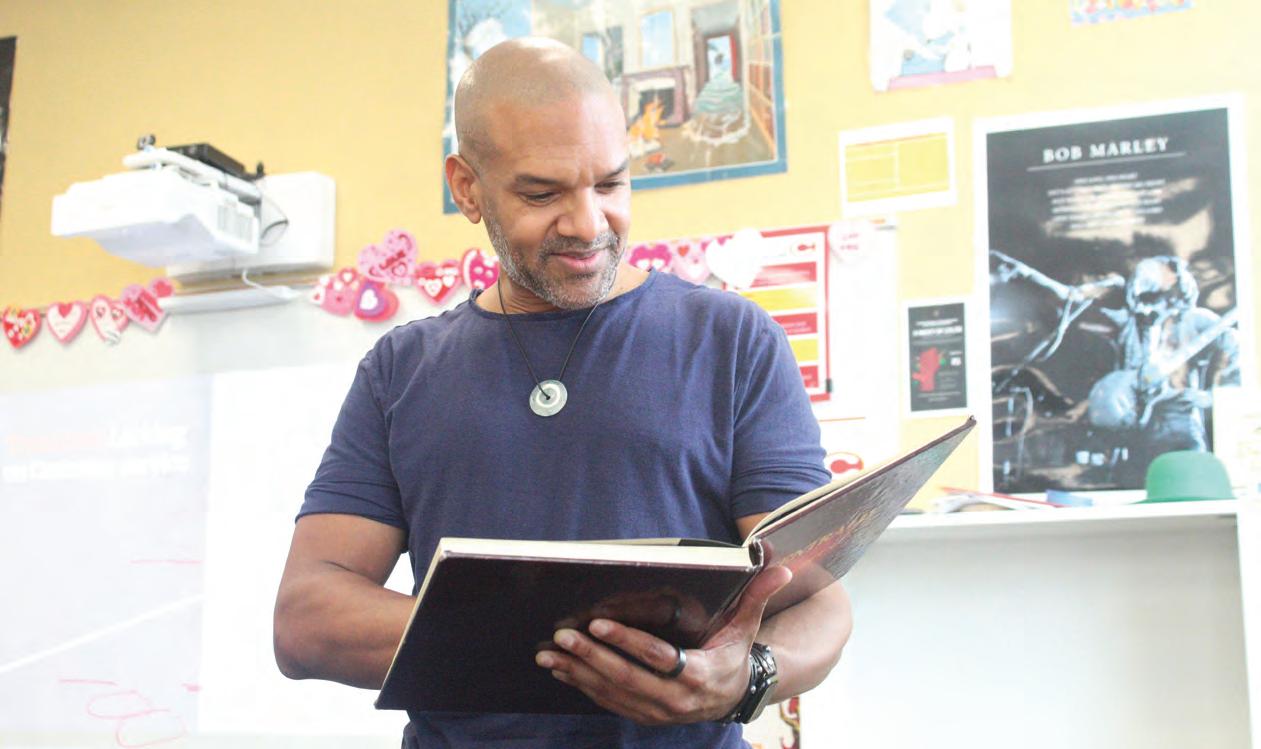
Clarke Central High School Class of 1990 alumnus Khary Payton discusses his experience growing up in Athens and love of acting.
Sports staffer sam harwell: How does it feel to be back in Athens?
Actor and Clarke Central High School Class of 1990 alumnus Khary Payton: It feels good. I’m most excited to meet people who knew my parents. My mom moved out of (Athens) about four years ago, so it’s nice to have people (who) know them. The funny thing about Athens is that most people who come up to me on the street that I don’t know, know me from my work because I work in TV and film. But in Athens, most people come up to me because they know my mom and my dad. My mom is the friendliest person you’d ever want to meet, and my dad was a pediatrician in Athens for 40 years.
SH: Your father, Victor (Payton), was an mportant figure in athens, how did he influence you growing up?
KP: My dad died about four or five years ago, and I hear all these stories after he died about the things that he would do as a pediatrician. You could call him all hours of the night and he’d keep samples of medicine that, if you couldn’t afford it, he’d just give (it to) you. That’s just my dad, and that’s the way he took care of people. I would walk around town with my dad, and people would come up, ‘Hey, Dr Payton, how are you doing?’ It was either the parents or it was the kids who grew up. He knew so many people. My mom (also) makes friends everywhere. Between the two of them, it was like I was the guy walking around with celebrities.
Above: RETURNING TO ROOTS: Khary Payton, actor and Clarke Central High School Class of 1990 alumnus, stands in Room 231 looking at a Gladius yearbook on March 28. Payton grew up as a quiet kid, but has since starred in TV shows like “Invincible” and “The Walking Dead.” “Now that I’m back at Clarke Central, I just think about how much I was worried about what people thought of me,” Payton said. “Now, I want the kids here to know that it doesn’t matter what anybody thinks of you. It matters what you love.” Photo by Illiana Tejada
SH: What was Clarke Central like in the late ‘80s and early ‘90s? Did you act at CCHS?
KP: (When I was a kid), I loved “Saturday Night Live,” so I would mimic Eddie Murphy and all of those guys from back then. There was a contest that you could sign up for the cable channel Showtime, and they wanted kids to host their afternoon of children’s programming. You had to do a talent, so I did a bunch of “Saturday Night Live” skits and I won that contest. After I won, they were like, “What can you do on stage?” I was like, “I don’t know, stand up comedy?” I’d never done it before, but I just came up with a bunch of (jokes) and started doing stand up comedy. But the thing is, I was doing all of this outside of Clarke Central. I barely did anything in Clarke Central, I wasn’t very big and kind of quiet. I found that when I got on stage, I came alive. I think there’s maybe a lesson in that. Find a place that you can flourish, maybe it’s not in school, where you feel more comfortable with something. I always found that once I got on stage, I just felt more free to do more.
SH: So, you put yourself in the shoes of a character so much that you think what they think?
KP: I always thought that the point was for me to embody a character, but it’s not. It doesn’t stop there. The point is for me to embody this character so that somebody else can feel it. I remember I did this convention in San Antonio, (Texas), early on, when I was doing the TV show, “The Walking Dead.” I think people really gravitate towards that show, because it’s people who are struggling, in a dark situation and they’re trying to find family and connection and energy. (As) I was finishing up (the convention), this woman came, and she had come from all the way across Texas. She gave me the biggest hug, and she held on to me. She said, “It’s just been so hard.” And that’s all I remember her saying. I thought about why she was saying that to me. She had all of these things go wrong, went all the way across Texas to get to this convention, to give me a hug because somehow that show helped her get through it. That’s the job, that’s the relationship. And I feel like that’s something that everybody can learn, is that whatever you’re doing, no matter what the job is, it’s to find connection with the person across from you.

KP: When I was in the first grade, while I lived in Alabama, I saw the play “Cyrano de Bergerac”, and there was this dude sword fighting, and he was smart, fast and quippy and I was like, “I want to be that guy.” So, by the first grade, my mom knew that I wanted to do theater, and when we got to Athens, I started doing plays at the recreation center. What I loved about acting was the connection that you could get when you were doing theater. You have an immediate reaction with people. That connection, to me, is magical. So whenever I’m doing anything, even if I’m doing TV or cartoons, there’s somebody that’s gonna click, right? Even if I never meet them, it’s gonna click with somebody. But sometimes, I get to meet all of those people and I can see it in their eyes that they were like, “I was watching, it connected with me.” The end result is that I want to feel it so much that whoever’s watching me on TV can feel it, too. Because maybe I’m gonna meet that person and see it in their eyes. That’s what drives me.
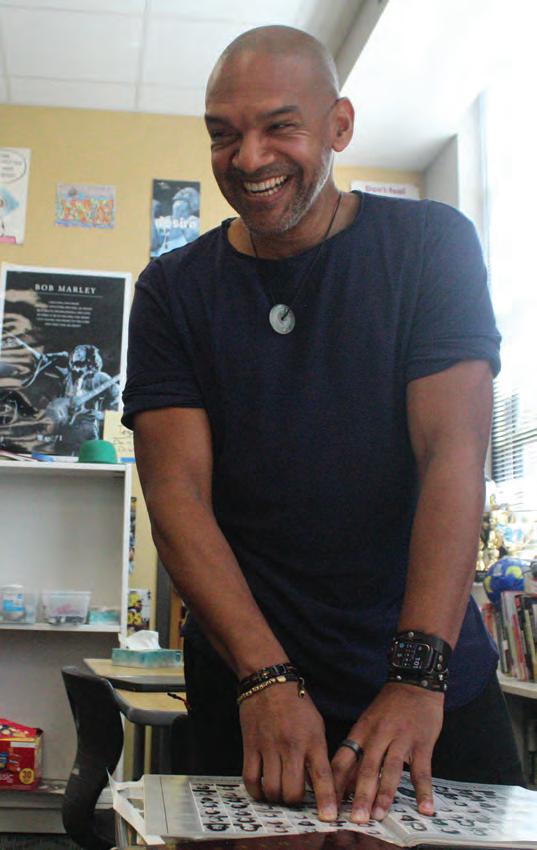

Member of indie rock supergroup boygenius Lucy Dacus released her latest album, “Forever is a Feeling,” on March 28. It is a powerful collection of songs that represent the complexities of love.
“Forever is a Feeling” is the artist’s fourth studio album and is truly sweet, sensual and sentimental, as it tells a story of Queer love with her bandmate Julian Baker. The album is a vocally profound piece of work shown through Dacus’ dedication to telling her own love story.
The leading singles, “Ankles” and “Limerence” are excellent introductions to the album and combine the groovy and emotional themes found throughout. The mix of themes can also be seen in the strong guitar strumming heard in “Best Guess” and “Bullseye,” the latter of which features Irish musician Hozier.
With meaningful vocals and tender lyrics, this album is a must-listen for any fans of boygenius, Dacus’ previous works and a good love story.
-- Peter Atchley, Diversity and Representation Editor

The limited-time Krispy Kreme and Hershey’s Chocomania Collection was released on March 19 and features four new flavors including the Hershey’s Chocolate Chip Cookie Doughnut, the Hershey’s Chocolate Salted Caramel Cheesecake Doughnut, the Hershey’s Chocolate Buttercreme Doughnut and the Hershey’s Classic Chocolate Doughnut.
With the specialty dozen starting at $20.99, this dessert does lean on the expensive side. However, the doughnuts’ taste more than makes up for it, as all of them are very rich in flavor with the toppings adding a nice texture.
Unlike normal light and airy doughnuts, these were filling and thick, especially the Hershey’s Chocolate Salted Caramel Cheesecake doughnut. This pastry had a creamy filling but gave tones of custard as opposed to cheesecake.
Overall, the doughnuts are riddled with complex flavors and textures, making them seem like a fancy dessert instead of a $2 doughnut.
-- Miriam Silk, Journalism I

With a title like “Boys with Sharp Teeth,” and the accompanying cover, one would assume that this young adult novel is about vampires.
Whether it actually is, though, is unclear.
American author Jenni Howell’s first book, released to all major booksellers on April 8, is, at best, confusing and, at worst, nonsensical.
Marin James’ cousin’s body has been found in a creek on the property of Huntsworth Academy, allegedly the result of a drug overdose. However, Marin knows there’s more to Sam’s death, so she changes her name and enrolls at Hunsworth, determined to find the killers.
Most of Marin’s actions are without justification and fueled by romantic interest rather than grief, which makes the entire plot appear pointless and confusing.
Also lacking clarity are the supernatural elements, which are introduced too late in the book to give proper context.
Overall, readers looking for a compelling dark academia novel should look elsewhere.
BY ADAH HAMMAN Variety Editor
Released on April 1, “Say You’ll Remember Me” is American romance novelist Abby Jimenez’s ninth book, and though diehard fans of the author may love it, others should find it cringeworthy and forgettable.
The 368-page novel follows Samantha, a social media manager for a mustard brand, and Xavier, a veterinarian. Obnoxiously, the two meet when Samantha brings a stray kitten to Xavier’s office, where he asks her on a date. There, they bond over their shared love of animals and similar personalities. However, there’s a problem: in less than 24 hours, Samantha will be moving across the country and Xavier won’t be able to see her again.
While there are certainly enjoyable moments throughout the book, like the main characters’ dates the majority of it is slow and uninteresting. There is nothing remarkable or even special about the two main characters, and the same goes for the plot.
Additionally, the conflict could have been addressed much earlier, but instead drags on for several hundred pages, leaving readers bored out of their minds by the time it’s finally resolved.
As for the writing, it’s mediocre at best and cringe-inducing at worst. For some reason, Jimenez feels the need to include modern-day slang, which dates the book and should give readers major second-hand embarrassment.
Overall, “Say You’ll Remember Me” is a dull read and one that readers will not, in fact, remember.
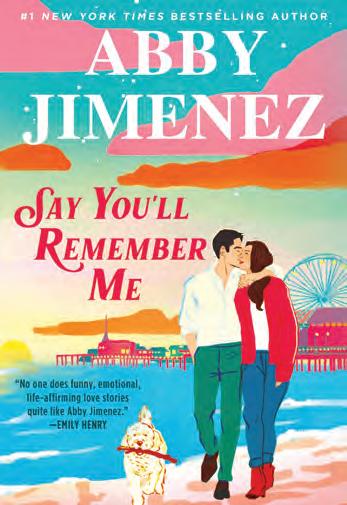
Photo by Iliana Tejada
Featured: GRAD HUG: Clarke Central High School senior Karl Ritzler hugs CCHS math department teacher John Ritzler at the Class of 2025 Graduation Ceremony on May 22 at the Akins Ford Arena. Ritzler expressed that watching his son graduate was an exciting moment. “I’m proud of him for getting to this point, but more (importantly) I’m excited for what he gets to move into next,” Ritzler said. “With all students, including my own son, how much yall grow up from the time you’re in ninth grade to being seniors, not just as humans, but academically, it’s fun to watch, it’s a big change.”
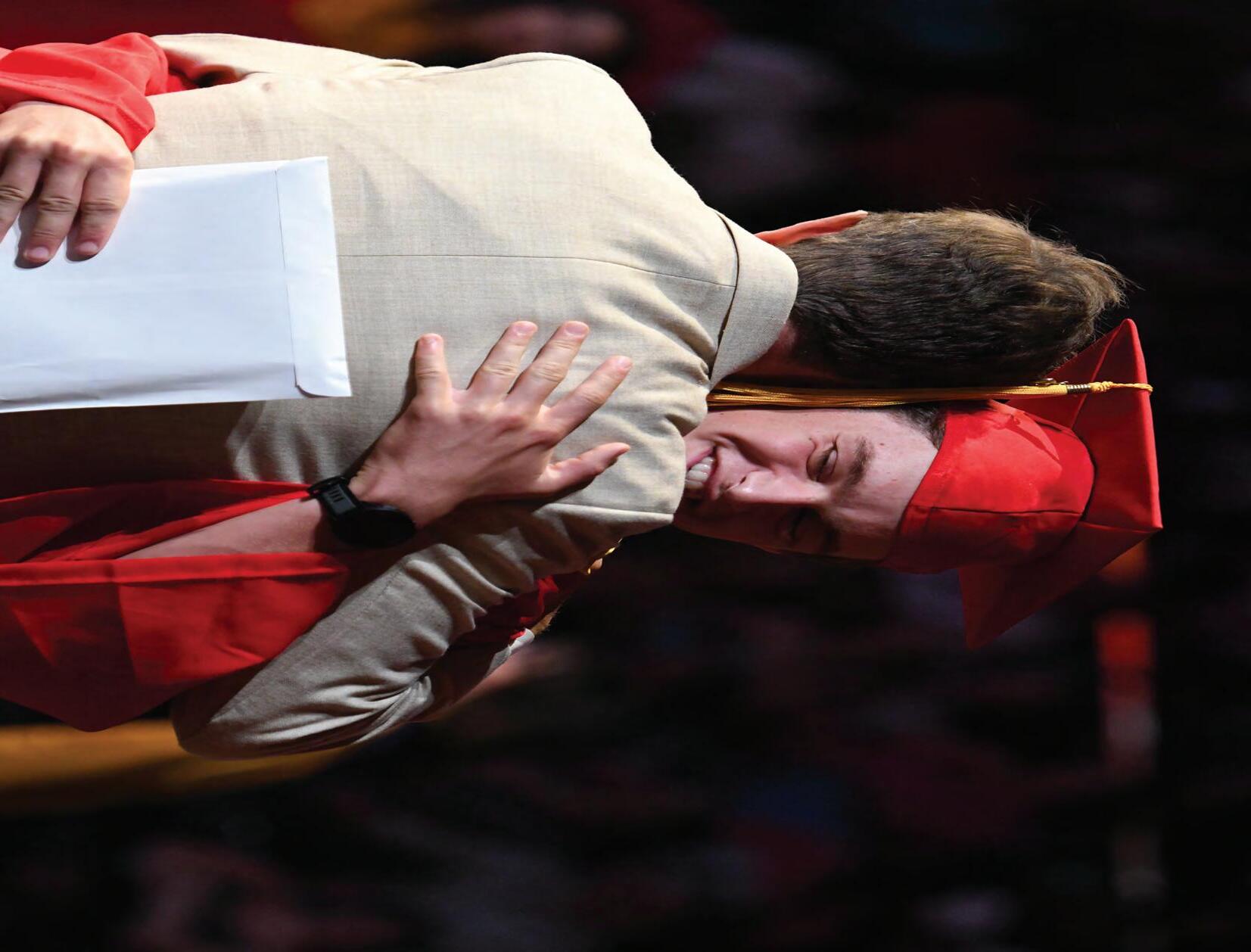

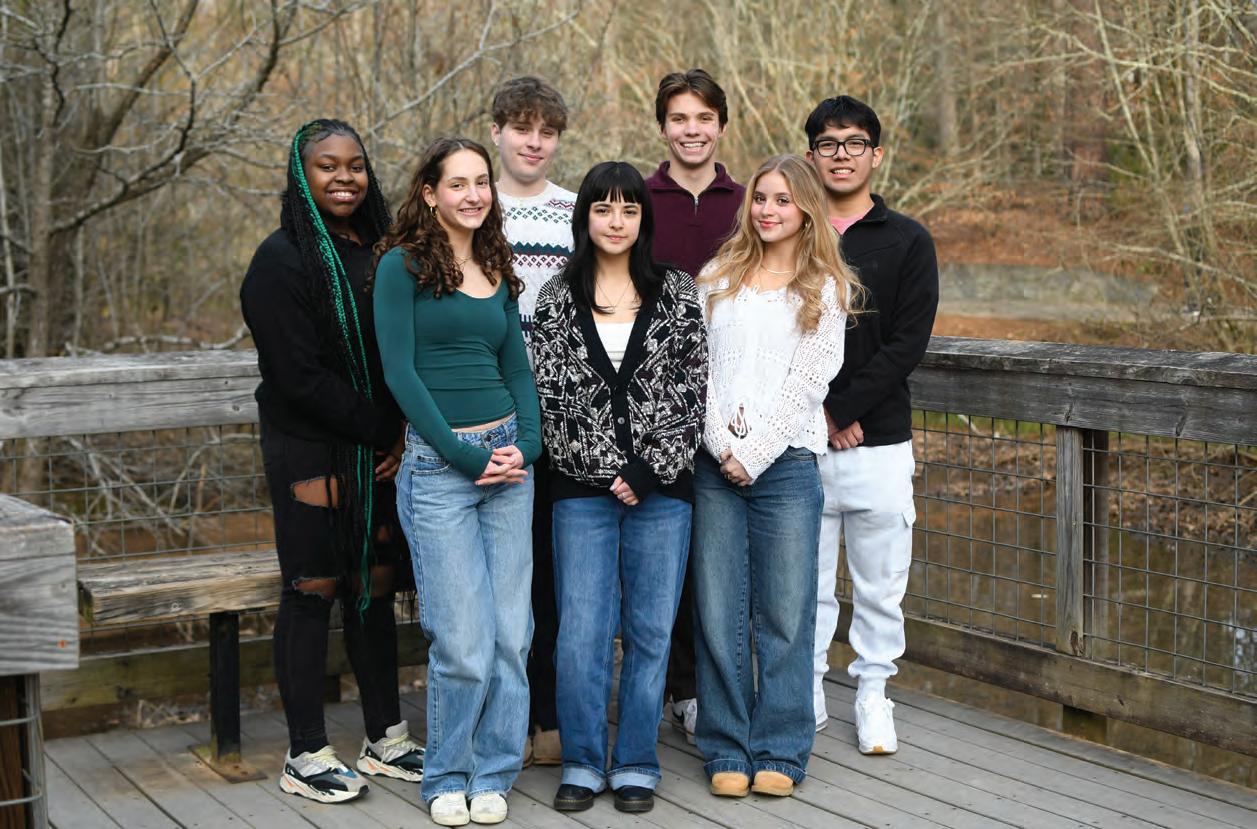


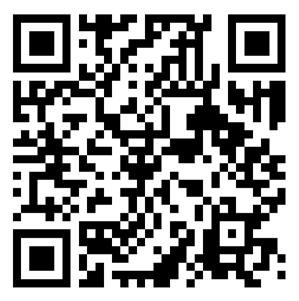

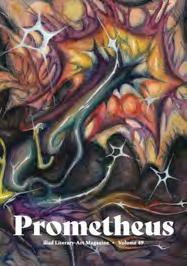


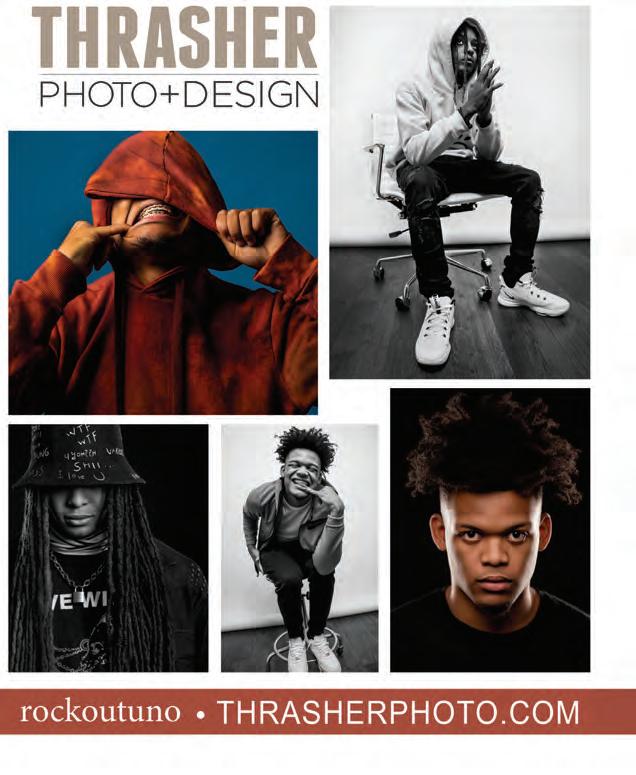
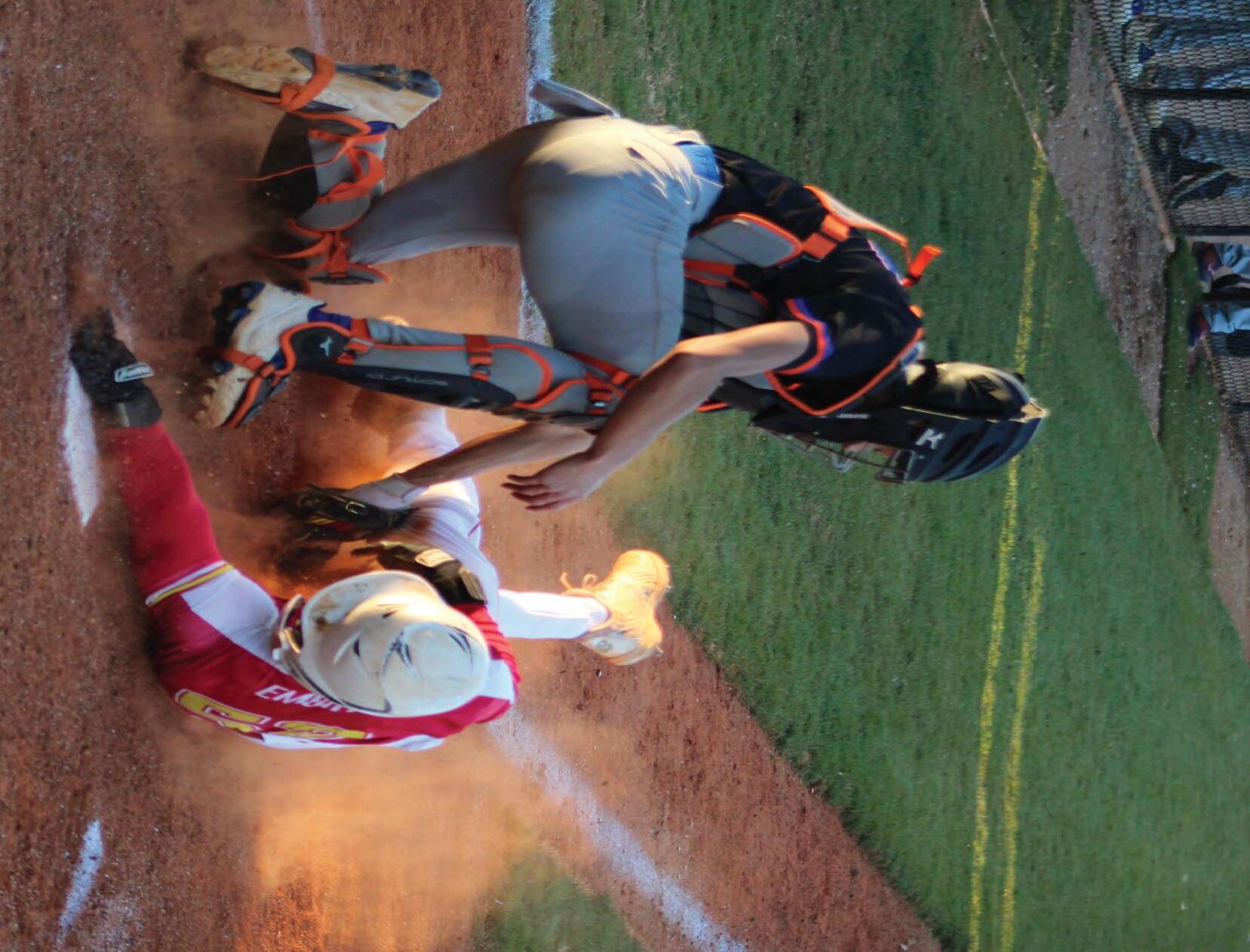
Featured: Clarke Central High School sophomore and varsity baseball shortstop, Casper Emory slides into homeplate on March 3. The Gladiators dominated Cedar Shoals High School with a final score of 16-0 at CCHS’A.B Weathersby Field. “I felt great about last night. It was a full circle moment for me as my first win as a Gladiator was against Cedar,” CCHS senior Macon Davis said. “It was a lot of fun for us, seniors, to take on our (rival team) one last time and take home the dub. It is something we will remember for a while.”
In the age of social media, professional athletes have immense influence on young fans, making it crucial for them to set better examples.

BY LIYA TAYLOR Social Media Coordinator
In 1993, National Basketball Association star Charles Barkley boldly declared in a Nike commercial, “I am not a role model. Just because I dunk a basketball doesn’t mean I should raise your kids.”
The statement ignited widespread debate, but three decades later, one thing has become clear – athletes are role models, and they need to set better examples. CCHS varsity football player and track and field athlete AJ Lonon, a junior, has grown up watching professional and collegiate sports and recognizes the impact athletes can have on their fans.
“A lot of people see athletes and they think, ‘I want to be like him. I got to be flashy, say bad things, buy the chains (and) drive fast,’” Lonon said. “Because you see athletes doing it, you don’t see how that’s not good for you.”
setting the right example for younger generations.
Their visibility inherently makes them influential and when adolescents witness their role models engaging in reckless behavior, it can normalize such actions, undermining the values that sports aim to promote.
“It’s become a job that you have to be a role model if you’re an athlete because so many people are looking up to you,” CCHS strength and conditioning coordinator Joshua Dawson, a former University of Georgia and Atlanta Falcons outside linebacker, said. “I tell my athletes (that) even in high school you can change your life with a smart decision versus one dumb decision.”
With athletes’ elevated platforms, they need to act more responsibly.
On Oct. 8, 2024, University of Georgia wide receiver Colbie Young was arrested and charged with battery and assault. Similarly, Kansas City Chiefs wide receiver Xavier Worthy was arrested on March 7 for a criminal charge of assault by impeding breathing or circulation. Texas Rangers pitcher Matt Bush was arrested on Oct. 3, 2024 and charged with collision involving injury, evading arrest and driving while intoxicated for at least the third time. With constant eyes on these athletes, they need to be better role models
With athletes’ elevated platforms, they must act more responsibly. Embracing this role doesn’t mean leading a perfect life, but rather striving to exemplify positive behavior, acknowledging missteps and using their experiences to educate others.
Barkley’s declaration may have resonated in 1993, but with social media amplifying athletes’ actions today in a way that wasn’t possible then, they no longer have the luxury of opting out of influence. Their words, actions and choices are magnified and shape the values of aspiring athletes.
By acting more responsibly and setting a high standard, professional and collegiate athletes can become more than just competitors – they can be leaders inspiring young fans to chase excellence.
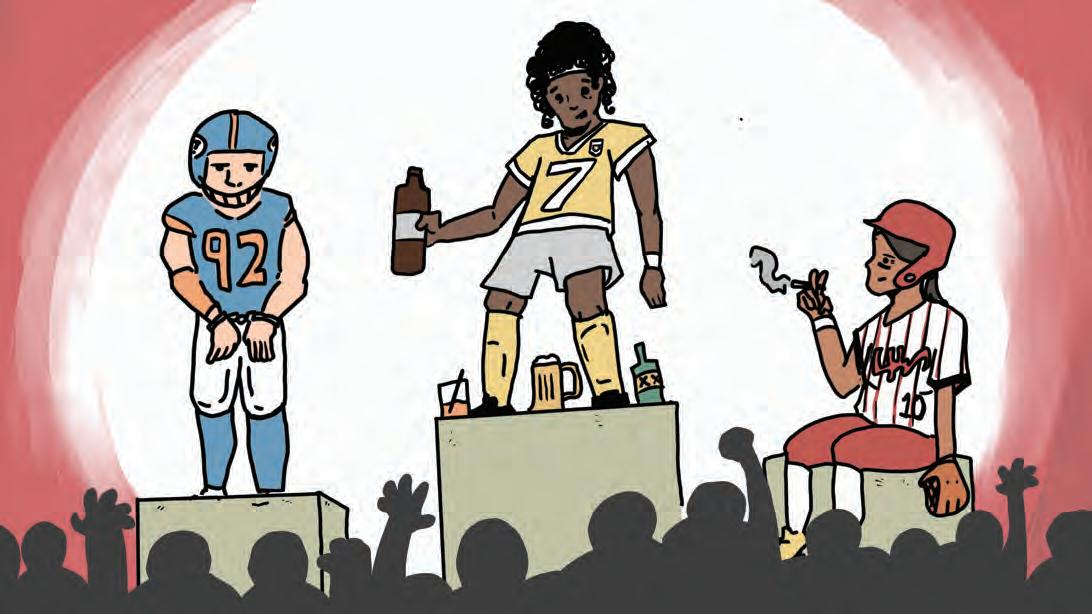
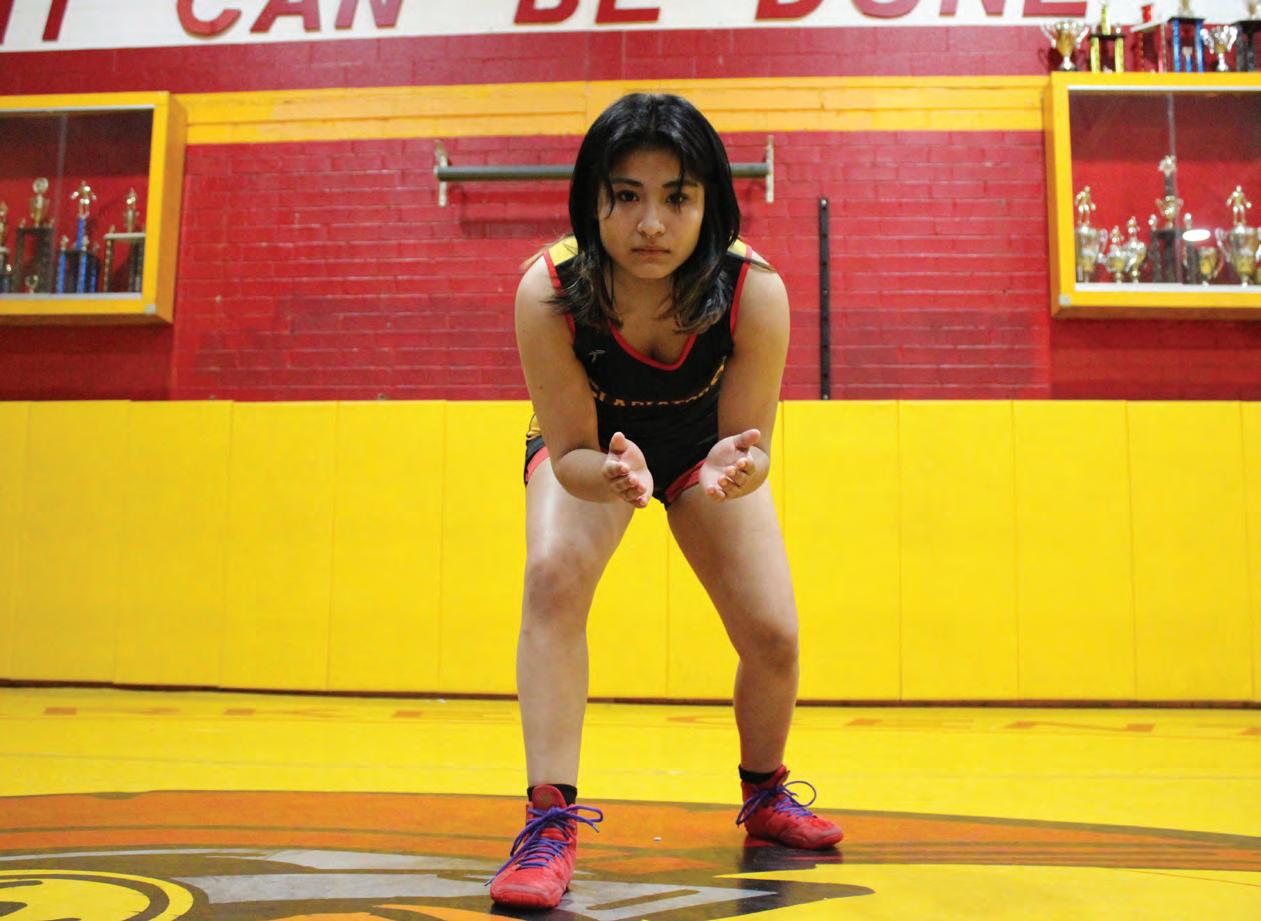
CCHS girls varsity wrestler Moon Uriostegui has continuously set high expectations for herself as she grapples with being a female in male-dominated combat sports.
STORY BY KEVIN CAPCHA Sports Staffer
BY LIZA LARSON News Editor
Under the gym lights, the aroma of sweat fills the air. Kimberly Uriostegui, a junior, stands with the weight of history on her shoulders. Nicknamed Moon, she’s Clarke Central High School’s first female wrestler to win a GHSA Region 8 championship and the first to qualify for the state tournament under standard rules.
But before the gold medal, there were years of feeling like an outlier as one of the few girls in martial arts gyms. Her legacy wasn’t built instantly, it was forged in every moment she shot for the moon.
At seven, she laced up her first mixed martial arts gloves. She watched as the boys paired off, leaving her alone. It was then she gave herself the name Moon, a way to mask her femininity in the gym.
By the time other kids her age learned geometry, she had earned a first-degree black belt in Taekwondo. By 14, she had kicked her way to two United Tae-
kwondo Alliance national titles. By 15, she started Muay Thai, craving a new challenge.
In combat, she found purpose. In challenge, she found drive. In every match, she fought like it was her last.
In high school, her ambition was no different. As a freshman, she walked into the wrestling room – once again one of only two girls in an entire room of boys – but this time, the solitude felt heavier. This was no longer just a pattern. It was a cycle begging to be broken.
She knew she had to stay, not just to wrestle, but to ensure no girl after her would step onto the mat alone.
For Moon, the fight isn’t over.
Now, she isn’t just reaching for herself when she shoots for the moon. She’s lighting a path so that one day those who follow won’t have to shoot for the moon, just stand on the mat.
CCHS Class of 2018 alumnus Jack Mangel, who returned to CCHS to teach and coach at the start of the 2024-25 spring semester, built his football career on toughness.
Jack Mangel walks the halls of Clarke Central High School with a slight limp, the consequence of a decision to treat a knee injury with a steroid shot rather than surgery - one he doesn’t regret.
From starting as CCHS varsity football quarterback between 2015 and 2017 to his time at Concord University to his stint playing professional football overseas in 2024, Mangel pushed through pain, playing with injuries that would have sidelined many athletes.
His high school career was marked by a persistent ankle injury, swelling up to twice its size, but he played on. As long as he could walk, he’d be on the field playing the game he loved.
He had to be carried between plays during the last game of his senior season against Carrollton High School, but he played on. Sitting out was not an option.
And after playing college football at Concord University, where he broke program records for passing touchdowns and completions, being named a 2022 Division II All-American, Mangel knew he wanted to play on. He found this opportunity in the European League of Football, and left to play professionally
in Hungary in 2024.
Here, he injured his knee early on in his first and only pro season. Doctors gave him two choices: knee surgery and recovery back home, or a cortisone shot and a return to the game.
Jack Mangel chose to play on.
He took the cortisone shot and completed his first and only pro season, but knew afterward that it was time to hang up his cleats, partly because of the lingering effects of his injuries.
“I definitely can’t move as much as I did six months ago, but that’s part of the decision I made. If I had to go back to do it again, I’d do it the same way,” Mangel said.
Back at CCHS, he’ll be the varsity football running back coach, hoping to impress the importance of enjoying the game while they have the chance on players.
“You only get so many games in your life, and a lot of people don’t even get the opportunity to play after high school,” Mangel said. “So don’t take it for granted.”

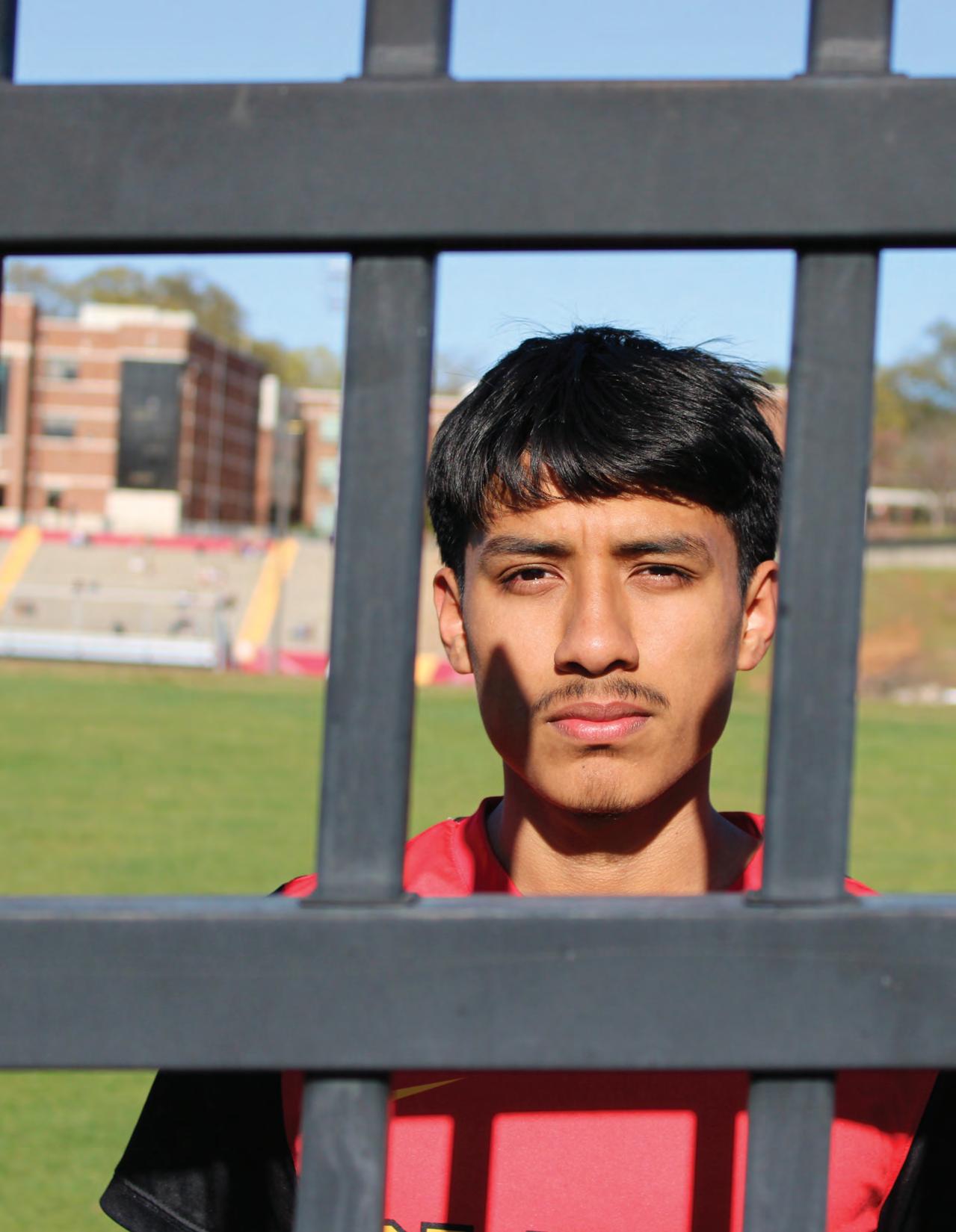
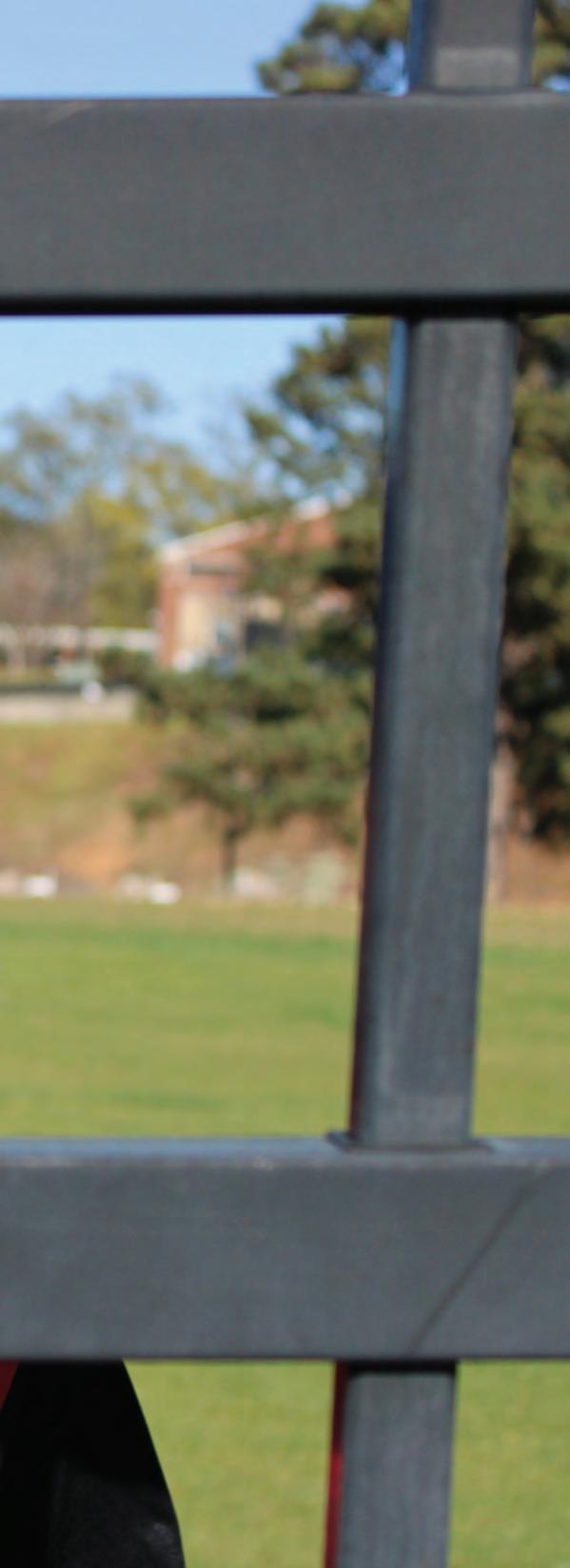
Socioeconomic
barriers are turning sports
into a privilege rather than an opportunity for Athens youth.
STORY BY KEVIN CAPCHA Sports Staffer
LAYOUT BY ISABELLA GRESHAM Viewpoints Editor
Every day after school, a young Mario Perez would lace up his cleats and go to his neighborhood park. He had played pick-up soccer since he was 5, wondering if there would be a day he wore a club jersey like his friends at school.
At 13, that vision came true when his parents enrolled him in the Athens United Soccer Association. But a year later, reality set in as barriers arose, forcing him to leave.
“I decided to leave because my parents couldn’t find time anymore to take me to games (and) practices. Also, money-wise (AUSA) was costly,” now Clarke Central High School boys varsity soccer midfielder Perez, a sophomore, said. “So I (thought) it might be better to leave (and) not put a burden on my parents (or) make them feel guilty for not letting me play.”
Perez’s story reflects a broader reality for many families in Athens. For some, the difficulty lies in covering costs, while for others, it’s the time, travel or the way the youth athletics system is structured.
“The lack of financial means prevent some of our students (at CCHS) from participating.”
-- DR. jon ward, CCHS Athletic Director
“I’ve seen (barriers) across the board in volleyball, basketball, football to soccer. There are challenges that (Athens) families and kids face as a result,” former Clarke Central High School Associate Athletic Director Chris Hulse said.
According to the Utah State University’s Families in Sports Lab, youth athletes from low-income households are six times more likely to quit sports because of financial costs than high-income kids. However, coaches and athletic personnel in Athens don’t have to know this statistic for it to hit home.
“Unfortunately, many opportunities for youth to participate in athletics involve some type of registration (or) participation fee,” CCHS Athletic Director Dr. Jon Ward said. “The lack of financial means prevent some of our students (at CCHS) from participating.”
United Soccer Association for only one year, while many of his CCHS teammates have played for several years due to fewer financial barriers. “Everywhere I go, people I ask have been in club soccer for many years, and (I), only (playing) one year, feel left out of (the) conversation,” Perez said. “They all have trophies they won with their club. (Team) chemistry wise (not playing club) is impacting me.”
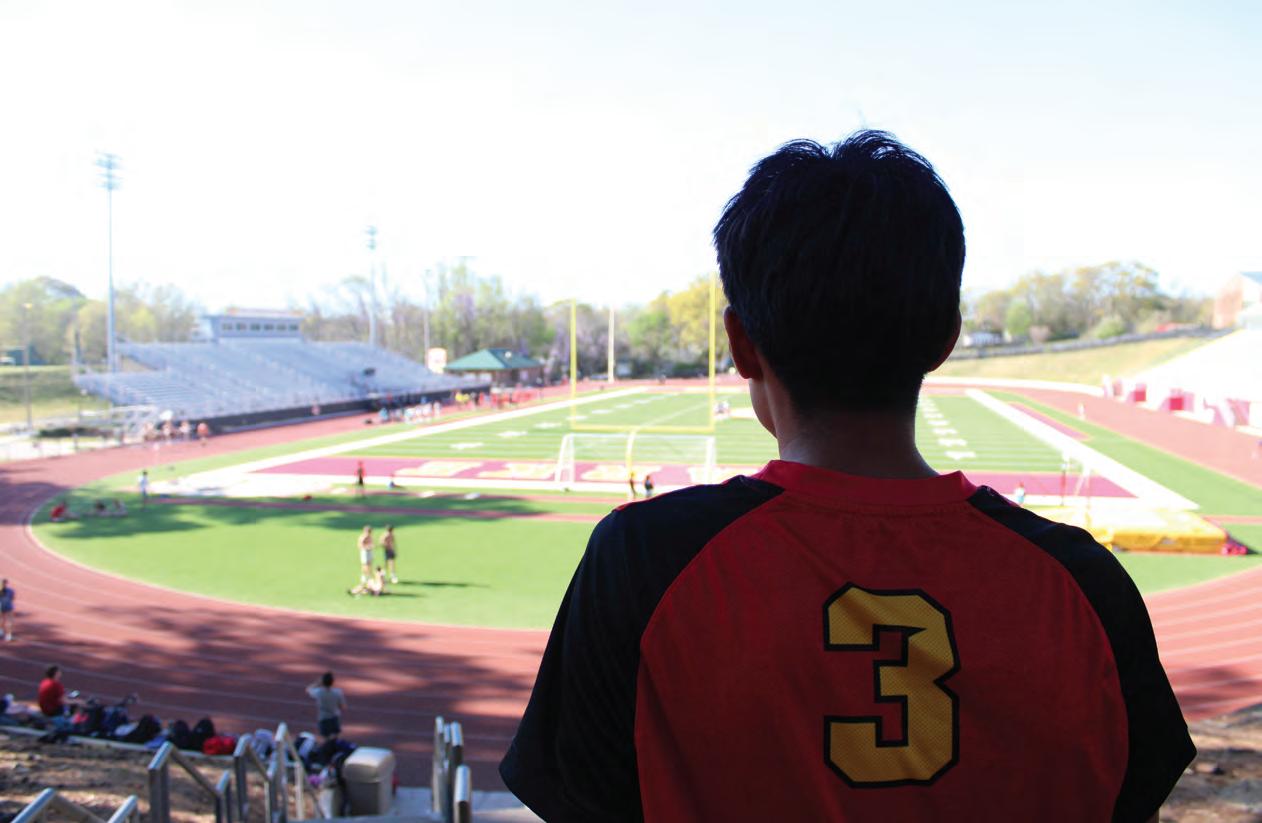
Barriers to sports participation in Athens don’t just come in the form of not being able to register but in other forms that go unnoticed. For many Athenian families, their barriers to sports start on a national level, where children go from high school to collegiate teams as opposed to youth academies like other countries.
“The U.S. is (one of) the only (countries) where promising athletes come through a high school-college system,” University of Georgia sports journalism associate professor Dr. David Welch Suggs, Jr., Ph.D.
Associate Director, Carmical Sports Media Institute said.
“Coaches in (high) schools don’t have the time (or) expertise to give kids everything they need to be competitive at a college level.”
As a result – unlike Europe’s hierarchical recruiting system or Asia’s government-subsidized sports schools – U.S. clubs focus on selling opportunities to families rather than developing players, pressuring parents to spend more money.
Locally, these national trends are amplified by limited options. Athens has very few club organizations outside of scholastic sports, leaving families with no alternatives when school seasons end.
zation, they’re forced to commute to another club miles away, sometimes near the Atlanta metropolitan area. However, commuting presents its own challenge for low-income families.
“The reality is a lot of times those parents cannot necessarily afford to take the time off to do that from their job because of their socioeconomic situation,” Hulse said.
The socioeconomic composition of Athens means club organizations are less willing to expand into the region, leading to scarcity. Thus, the shortage of club sports starts to affect athletes who may not come from low-income backgrounds, expanding the problem to a city-wide issue.
“I never asked for help. (AUSA), teammates (and) their parents were offering to help. But I felt embarrassed to receive that money,”
-- Mario perez, CCHS sophomore
CCHS girls varsity volleyball middle blocker Makaney Burnette, who currently plays at North Georgia Volleyball Club, based out of Gainesville, has felt the difference of playing for a club sport team.
“Club (volleyball) is known to be super competitive compared to high school volleyball. With club, you pay to play, so you’re expected to be good,” Burnette said. “Personally, (club) helped with my skills (of) team bonding and being around people I’ve never seen before.”
“There are monopolies within youth sports here (in Athens), as well. There’s not a whole lot of competition for players. If you’re not happy with your choices, then you got to go a long way away to get someplace,” Suggs said.
For a low-income Athens family, that lack of competition creates an added financial strain. Without other choices, they can’t negotiate for fees, seek better training environments and receive lower return on their investment.
If a low-income Athens family is discontent with one aspect of a club organi-
However, in the long run, the largest impact of a shortage of clubs is in the early athletic development stages.
“If I started out younger, I would be a lot better and stronger than I am right now because (volleyball) does take a while to get the basic skills that you have to learn,” Burnette said.
Another unnoticed barrier is culture: even when clubs attempt to support the youth, cultural norms and stigmatizations prevent individuals from receiving help to continue their sports journey.
“I never asked for help. (AUSA), teammates (and) their parents were offering to help, but I felt embarrassed to receive that money,” Perez said. “I didn’t feel I deserved it and felt like I was stealing their money.”
However, stigmas aren’t the only factor within cultures that cause barriers in Athens. According to Suggs, another cultural aspect is the lack of cultural capital – defined as non-economic resources such as knowledge, skills and behaviors –within low-income communities.
“Cultural capital matters. Having a family who understands how to navigate systems matters,” Suggs said. “I know who to reach out to but not a lot of (athlete’s) parents who immigrated to this country (or) not have English as a first language are going to have access to those things.”
Major League Soccer Next Lanier Soccer Association left back Will Hicks, a CCHS junior, has felt the impact of culture capital. A Douglas County native, Hicks grew up with his mom, helping him commute to Athens United, and his dad, a former collegiate football athlete who got Hicks a tryout for LSA through connections.
“(My family) had a huge impact on me, because I see all the networking and connections that they have,” Hicks said. “(I am) thankful for my parents supporting (me). I know it’s difficult for other (Athenians) to do like (me to) find time to make two hour drives to training.”
All hope isn’t lost, however. In 2022, Clarke County School District launched the Youth Development Initiative (YDI) to address the gap in youth sports access. The YDI allows fourth and fifth graders to participate in various sports
“Cultural capital matters. Having a family who understands how to navigate systems matters,”
-- DR. Welch Suggs, Ph.D.
Associate Director, Carmical Sports Media Institute
free of charge. Over 2,350 CCSD youth students have participated, regardless of their income or athletic background.
Most notably, the YDI broke down barriers in girls volleyball, a notoriously expensive travel sport, by covering all costs and creating the first Athens-based volleyball club.
“(YDI) Volleyball provides free clinics for girls on Sundays. My own daughters have gone and they’re like, ‘Oh, we like this mom.’ We would have never done volleyball prior to that. So, (YDI is) a great way to expose (the youth),” CCHS associate principal Dr. Summer Smith said.
Additionally, the initiative is also mindful of equity beyond sports. Recognizing that low-income students may face greater academic struggles, YDI avoids disqualifying them based on grades.
“If you’re turning away a fourth grader who might be struggling academically, are you doing him (or her) any favors?” Ward said. “Athletics (teaches) young people to grow, learn about teamwork, self-discipline (and) work ethic.”
On top of the health benefits, soft skills developed through sports instill important values beyond their athletic endeavors, better preparing low-income individuals to escape poverty and access other opportunities.
Increasing access to Athens sports would not only benefit Athens through the economic uplift of marginalized communities but also unify communities to address the issues at hand causing socioeconomic barriers not just in sports but all sectors of society.
“(Athens’) club sports (and) high school sports can be (a) unifying factor to bring this community together. (Sports is) that visible part that we can rally around,” Suggs said.
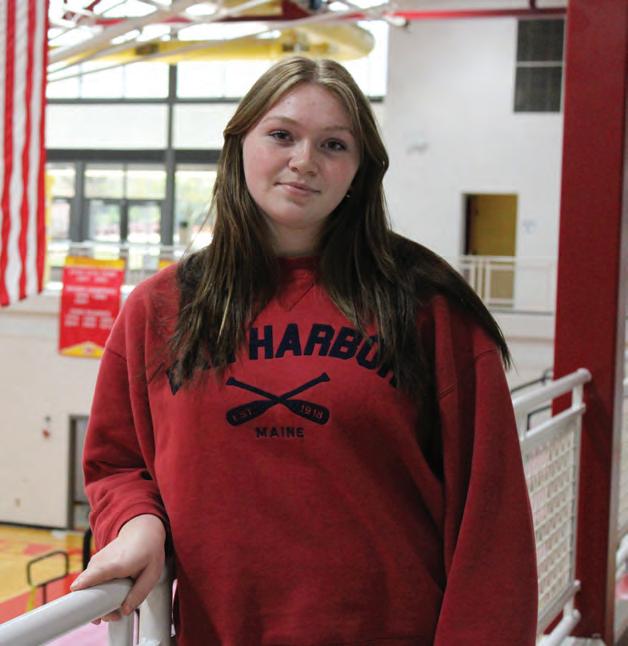
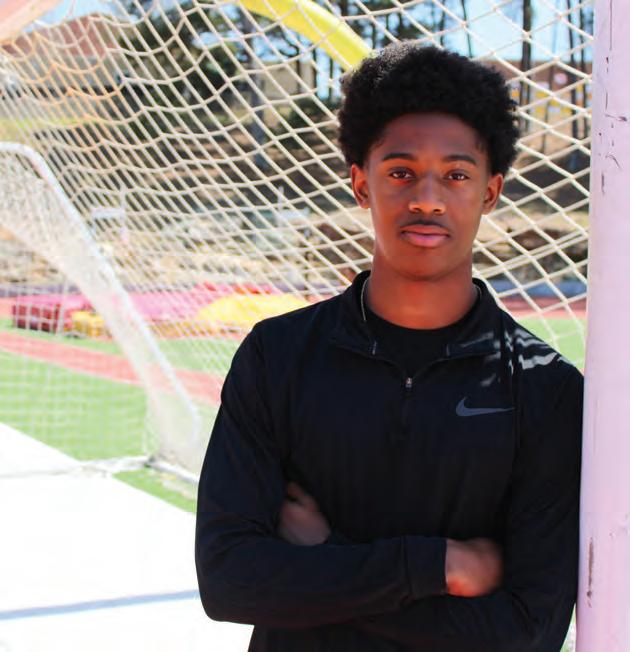
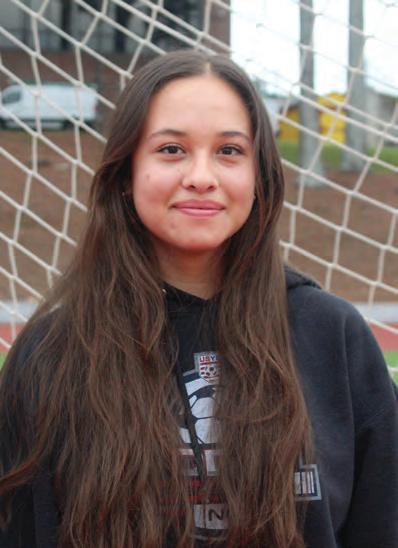
Grade: 9 GPA:3.86
Game day ritual: My pregame routine is usually to listen to music. I also stretch to make sure my body feels right.
Role Model: My mom works very hard, and I try to work as hard as her.
ODYSSEY Star Players are selected based on their academic standing and commitment to teammates, their sports program and Clarke Central High School. Star Players are written for each issue by the Sports Staff based on interviews with players and coaches.
Grade:10 GPA:3.64
Game day ritual: I normally eat a healthier lunch and drink lots of water a few days before the game. I stretch a lot and eat a small snack before the game.
Role Model: My role model would have to be my older brother and sister. They push me to be the best person I can be with soccer and without (it). They both (have shown) me that nothing is impossible if I really work hard at it.
Years of experience:13
Favorite memory: My favorite memory would have to be the bus ride back from winning our first playoff game my freshman year. We were blasting music, (singing), dancing and having a good time.
What coaches say: “Olivia is the type of player every coach dreams of working with. She truly loves the game and demonstrates that by putting in work at each and every practice. She is a quiet leader who leads by example.”
-- Head varsity girls soccer coach Gillen Schecter
Years of experience:3
Favorite memory: (My) favorite memory has to be (from this) year when we made the comeback against Oconee (County High School). (That game) was a surreal experience.
What coaches say: “Hudson is a great kid. (He’s) very humble, driven, wants to learn (and a) hard worker. He’s a young kid (who) has characteristics of being a good player and great leadership qualities.”
Damian Gary, CCHS varsity offensive coordinator
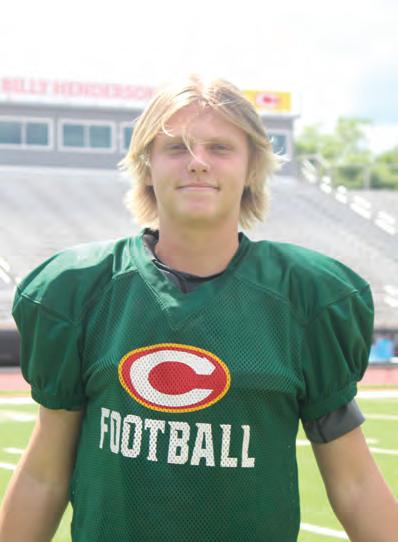
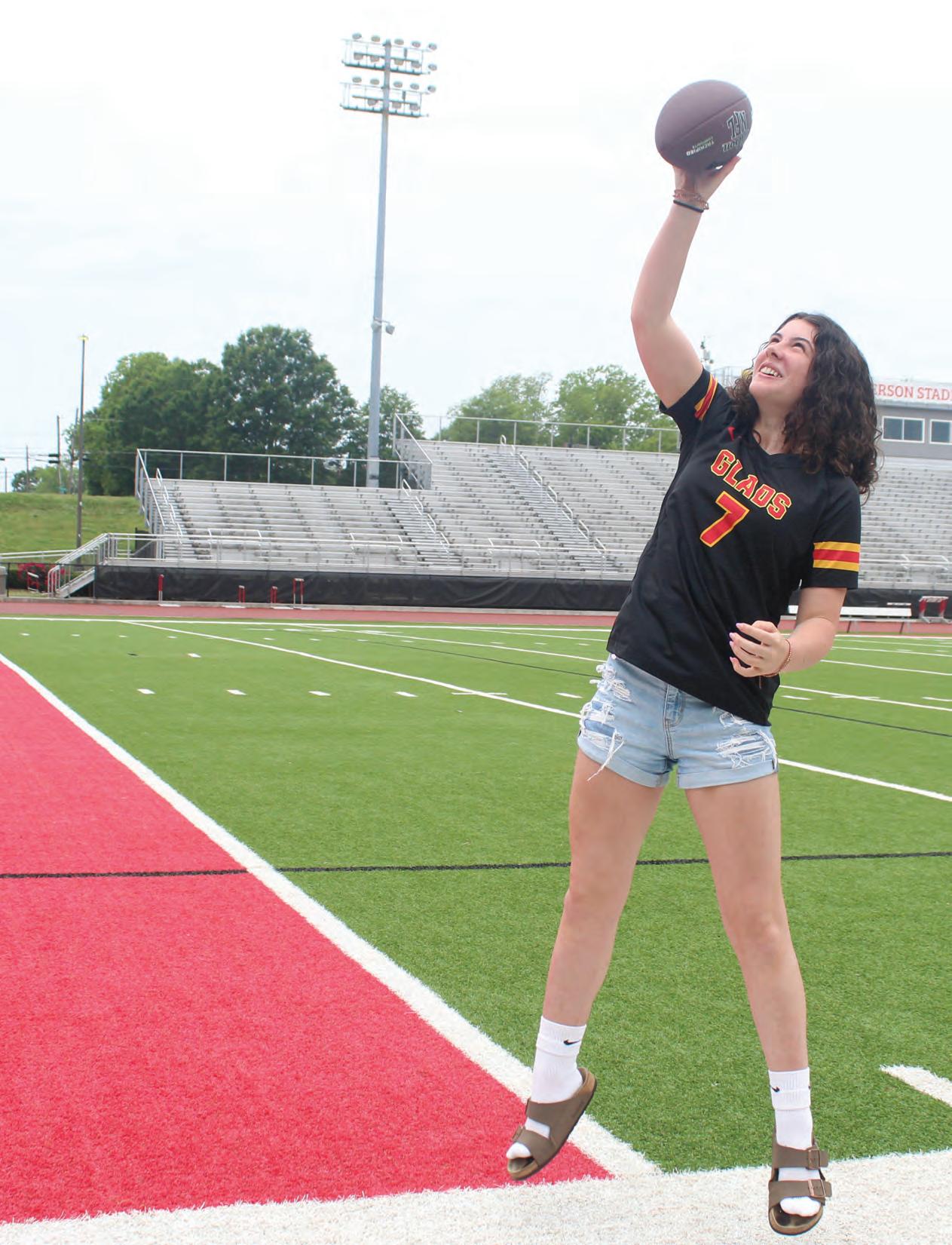
By sadie miller, as told to kevin capcha
(The team will) do ice baths. They really help my muscles recover. We do lots of stretches in the beginning to warm up to ensure no one gets injured. We’re focusing on different areas of our body each day, so we’re not burning out our arms or our legs. (Coach Pass) formulates our workouts in a way to where recovery is prioritized.
Before the summer, we do fifth period (in the) weight room. After, we transition into more mobility and plyometrics to learn how to be explosive. We’re not really focusing on maxing out. We’re kind of doing more reps and lower weight. (The team does) lots of lots of box jumps (and) squats. There’s some benching (to get) up arm strength.
Before preseason, (Coach Pass) plans out a whole calendar. She has four months planned out on what days and what times we have workouts. As for the individual workout plan of the day, we don’t know what it (will be). She’ll tell us as we go. Everything is very planned.
I (have) played basketball, soccer and track. Flag football is definitely the most together team I’ve ever been on. The team bonding is unlike anything I’ve done for any other sport. (The team) hangs out outside of practice (and) school. The conditioning (is) more difficult than other sports, because Coach Pass has a standard of excellence.
Sometimes we have middle schoolers with us, (so we pick) out younger kids to mentor and encourage, and so they have an older person to look up to during the workouts. A lot of it is leading by example. I’m not going to cut anyone short on reps. I’m going to do what I need to do, because I know the little kids are looking at me.
A seamless blend of historic Greek Revival charm and modern luxury, The Athenian offers a unique and stylish stay in the heart of Athens.
